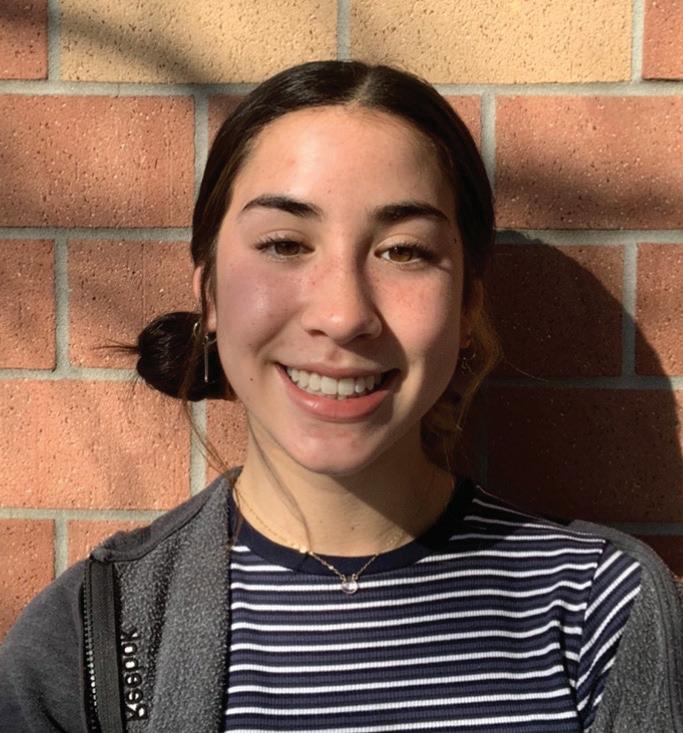
94 minute read
AP Human Geography v AP Euro
The rise of enmo
If you really knew me, you would know...
Advertisement
Virtual payment app remains popular within teenage demographic Gazette illustration/DYLAN ROWE
BY ALI JUELL ajuell.gazette@gmail.com Battle of the sophomore APs P hones have everything these days. Recipes, full-length shows, the list goes on and on. They now have the opportunity to not only change cooking and entertainment as they’ve always been known but to also change how money is transferred. Many teenagers have forfeited physical payment methods for easy access on their phones with the use of apps like Venmo and Apple Pay. Venmo allows users to digitally transfer money to their friends or other contacts, while Apple Pay utilizes a physical credit or debit card’s information to make transactions at businesses. “Most of my friends use (Venmo) and I... forget my wallet (sometimes, so) it’s really helpful for when I need to pay them back,” said sophomore Jerimae Pielago. Digital payment has become a great tool for any situation that arises, whether it be a spontaneous trip to Chipotle or a split appetizer at Mikuni’s. “(I) use both Venmo and Apple Pay,” said Stephanie Samson, a student at Sierra College.”With Apple Pay I can use it at stores and (to get) food. (Using) Venmo I can pay my friends if we want to split something.” Luckily, the increased use of digital payment by teenagers is even positive for local business owners. “(Digital payment is) really convenient and saves time and paper,” said Kat Tianpathong, whose parents own a restaurant in the Roseville area. “It’s good (for when) we’re busy.” Despite the overall positive reception, both apps have left something to be desired for some users. “Venmo takes away money if you want to do an instant transaction,” said junior Gabriel Weber, referring to the 1% fee users incur when choosing to have their transfer completed within 30 minutes. “It (can be) annoying.” In addition, many businesses have not yet begun to accept ApplePay, leaving some potential customers with no other ways to pay. “Whenever stores don’t take ApplePay I get anxious,” Pielago said. “(There are times when) the store or restaurant (I’m going to) doesn’t specify whether or not it takes (ApplePay), which can be stressful.” Even though both have a long way to go before they become common forms of payment for all customers, ApplePay and Venmo prove to be the latest successful change in how people exchange money At the end of the day, what is the key to the sudden popularity of Venmo and Apple Pay? “I think… it’s just a convenience thing,”Samson said. “(Also) it’s kind of fun to see what other people are (sending) each other (on Venmo). It’s like a new social media. It’s revolutionary.”
Students discuss which social science class is more beneficial
With registration for next year’s classes recently completed, the question for most freshmen interested in Advanced Placement classes was whether they should take AP European History or AP Human Geography for their sophomore year history class.
The transition into either one of these AP classes can be difficult for students who are not accustomed to the higher level content and new style of teaching.
Senior Ellie Scholes took AP Human Geography her sophomore year and although it was her first AP class, she didn’t find the course to be too demanding or strenuous.
“(AP Human Geography) was a big change, going from CP classes to AP classes, but based on the curriculum, I think it’s manageable and definitely not too difficult to learn for those interested,” Scholes said. Some students may have decided not to take the year long block of Honors English 10 and AP Euro, worried they won’t be prepared or perform well in a more rigorous course. Senior Kara Kleinbach disagrees, and believes any student interested and up for the challenge of AP can do well in the class. “The stereotype that AP Euro is too hard and only the smartest kids should take it is not true,” Kleinbach said. “Euro is a tough class because it’s everyone’s first AP class, but Mr. Valentine really helps you get engaged, understand everything, [and is] always willing to help you.” Most students seem to enjoy the alternative, AP Human Geo, but Scholes wishes she could have taken AP Euro as well, for its interesting history content.
“I’m very happy that I chose AP Human Geography because it was my favorite class (at) Granite Bay High School, but I do wish I had taken AP Euro because I didn’t realize how much I loved history until I took AP US,” senior Ellie Scholes said. BY SOPHIE CRISCIONE scriscione.gazette@gmail. Gazette photo /SOPHIE CRISCIONE
AP Euro teacher Michael Valentine agrees that Human Geo is an interesting class, but he does not think it gives students the history background they might need if they wish to continue into AP US History their junior year. “Mrs. Angelone does a great job teaching (AP Human Geography), and it’s an interesting course, but it is not a history course. It does not give you any history background, it is just that geography,” Valentine said. Juniors taking AP US History often find having taken AP Euro helpful. “If after Human Geo, you move onto AP US, you don’t have any history background and that can make AP US even harder,” Valentine said. Additionally, the format of the US History AP test is identical to that of the Euro exam, giving students who have taken AP Euro a year of extra preparation for the AP US test. “The format of the (AP) tests are exactly the same, so by them practicing when they’re sophomores, they’ve got it by junior year,” Valentine said. AP Euro students prepared for the DBQ all year long as sophomores, while the test format was completely new to Scholes and other students who had taken AP Human Geo. “I didn’t know how to write a DBQ going into the class and still didn’t feel confident at the AP test,” Scholes said. In the end, both AP Euro and AP Human Geo are intriguing courses that students should come into with the motivation and interest to learn. “I want students who want to be there, history is cool (and) even if you’ve never liked history before, I’ll get you,” Valentine said. AP Human Geography teacher Kathleen Angelone wants her students to put forth their best effort and respect others in her class. “I expect students that are willing to open up their minds and hearts to other cultures, be respectful of all people, (and) I expect students to try their best,” Angelone said. When making this tough decision, freshmen should remember to sign up for a class they want to take. “Consider what you’re most interested in, (and) don’t push yourself to take the higher level classes if you don’t want to,” Scholes said. Gazette photo /SOPHIE CRISCONE
ella rosenblatt
carson hailey

mehar rangi

garrett jeffrey
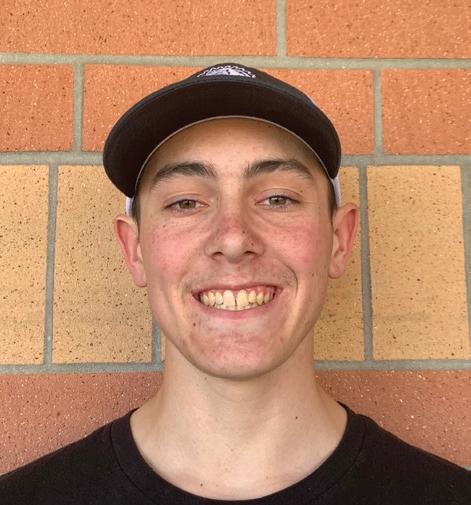
GBHS media program prepares to go nationwide Students who broadcast GBTV venture to an awards convention for their excellent work in broadcasting
As time progresses, each and every person on the planet gets closer towards discovering their niche. For some, it may be a talent, such as singing; for others, it may be a point of interest, such as enthusiasm for cars. Granite Bay High School, for example, boasts a multitude of differing programs and teams, and with over 2000 students in attendance, it’s no wonder that so many students find themselves interweaving passions with their education. GBHS’s Media program is a shining example of a set of classes with an easy entrance and a clear path involving higher levels of skill if one finds themselves interested. While many students may take Media Production, those inclined will move on to Advanced Media Production where they can produce stories, aid in the creation of GBTV, and even attend STN, a huge competition featuring schools from everywhere in the States. “It’s a yearly convention where students can compete, mingle with others doing the same, and learn from industry experts,” said Zach Weidkamp, who’s been heading the program for nine years and has attended every STN since. “They’ll do well. It all just depends on how much time they’ve put in to preparing. Anything can happen.” For the most part, each year contains a variety of different students spread across each class and grade level. However, the team travelling to Washington, D.C. this year finds themselves in a particularly tricky spot: there are no Media veterans attending alongside them. “We’re definitely a smaller, less-experienced group than last year … but we do have a lot of talent on the team, so who knows where we’ll end up,” Jake Russell said. He’s currently a junior and, as GBTV’s main anchor, is recognizable as in the program. As anchor, Jake is undertaking STN’s Anchor Team competition, in which a one-minute script must be produced, reported on, recorded, and edited all in the span of a day. However, Anchor Team only makes up a fraction of the competitions offered at the convention. Students may find themselves creating a music video, sports highlight reel, news report, or short story, which are all projects being undertaken by GBHS students in March. The crown jewel of the competition, however, is the Crazy 8, an eight-hour marathon in which teams must conceptualize and create an entire production. Even a second late, and the entry is disqualified. “Hopefully I can gain experience from everyone. We’re nervous, but we’re excited,” said Devin Madden, a current sophomore who is also in his first Advanced Media Production course in high school. “I love film and journalism, making stories that are fun, and giving people a good laugh. That’s what’s important to me.” BY JJ HILL jhill.gazette@gmail.com
Lifestyle Underclassmen become drivers on campus

Sophomores and juniors begin to get their licenses toward the end of the year, causing mishaps in the lot
Sophomores at GB have taken the wheel and there has been stress surrounding the community, regarding getting in and out of school as a new driver. Many students at GB have experienced the pressures of being a new driver at GBHS. “Coming to school is easy, but leaving can be hard because parents are aggressive,” sophomore Alissa Ansari said. An issue that is revolving the campus is how students are all supposed to get a parking spot at school, and getting in and out of school. Students need to find a place to park is tough as it is, but for some students getting to school very early, is not an option. “Some of the struggles I’ve had is getting out of Feist parking lot, because there is a ton of cars and you can’t really see when you’re backing out, if someone were to crash into the back of your car,” sophomore Hannah Harrison said. A lot of people who park at Feist tend to not leave a lot of room for other students which is a recurring case for Harrison Similar to the problems that Harrison mentioned sophomore Izzie Hillman mentioned that, “a struggle is having to get there [Granite Bay] at or before 7, to get a parking spot on the street or at feist.” A lot of the problems facing many of the students are not so many accidents or parking tickets, but rather getting to school on time, and early enough to get a spot somewhere before either a parents, or upperclassmen. This has been a big issue, and we are seeing how the students are adapting to it. “I usually try to get to school around 7:10 so I get a parking spot next to my friends and then when I’m leaving I wait for a lot of the traffic to clear out so it’s easier to get out,” Harrison said. There are ways students handle this situation, since sophomores are not supposed to park in the GBPL [Granite Bay Parking Lot] although some students in a rush to get to class still do. A lot of students are dealing with these same problems like Harrison, Hillman and Ansari, but are managing to get the job done and get in and out of school which is all that matters. “It bugs me when I back up so I have space to pull out but the car in front backs up right after I back up and then I have to wait for them to pull out,” sophomore Caden Self said. There are so many people at Feist making it difficult for the students who make it such a priority to get there early, to get out of the parking lot. “I get there at like 6:55 AM to get a spot in the morning,” Self said. This shows how dedicated students are to getting a spot, and what they are willing to do to get a spot, let alone a good one. For many students this would mean getting to school at the crack of dawn to resolve this issue. Many places are available for students to park in, but as a community it is difficult to get in and out with ease, as students are proving. Coming to school is easy, but leaving can be hard because parents are aggressive, – Alissa Ansari, GBHS sophomore BY BECCA NOLAN bnolan.gazette@gmail.com
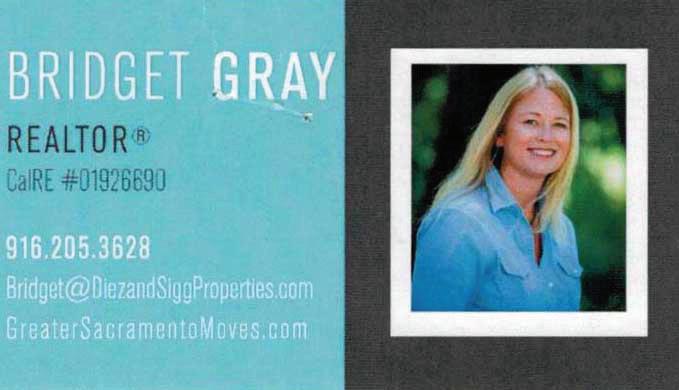

‘Team Zeena’ Project
Friends of cancer-survivor Zeena Alzanoon raise money in her honor for Leukemia Lymphoma Society
Stories about victims of the life-threatening disease of cancer has become all too common throughout the world. In fact, it’s almost become too common to the extent that feeling the direct emotions that should be a logical response to such tragic stories is sometimes a helpless case. However, when the victim is a family member, friend, acquaintance, or even fellow student, the impact has a far more touching, emotional element. This effect is a characteristic of the story of Zeena Alzanoon, a sophomore student at Granite Bay High School who survived cancer. On August 3rd, 2018, Alzanoon was diagnosed with Hodgkin’s Lymphoma, a rather inauspicious beginning to her high school journey. Alzanoon recalls stories of her fretting over finishing her homework, laughing about her worry to manage schoolwork in addition to her critical health condition. “Every time I would go to a chemotherapy lesson, I would try to do homework at the same time as they would last up to five hours,” Alzanoon said. “My therapists would always playfully scold me, asking ‘what are you doing? Put that away!’ Obviously the last thing I wanted to worry about was school, but at the same time it gave me a sense of normalcy.” After three physically enduring months and six cycles of chemotherapy, Alzanoon beat cancer on December 4th, 2018. Following her powerful success story, she vowed to dedicate her life to service. “Finally becoming cancer-free just made me really passionate about helping others get through everything just like I was able to,” Alzanoon said. “I really wanted to make a difference after everything I had gone through--to use my experience to do something good.” Her wishes certainly did not go unfulfilled. Inspired by her gripping story, Alzanoon’s friends formed an initiative to raise $25,000 for the Leukemia Lymphoma Society, dubbing themselves Team Zeena in her honor. Nominated for LLS’s Students of the Year fundraising program, sophomores Saiyra Qureshi and Olivia Kurani founded the project, gathering friends to help support Alzanoon through the improvement of the lives of young people like Zeena also fighting cancer. Desiring to show Alzanoon that she would never have to battle cancer alone, Qureshi jumped at the opportunity to lead a project directly inspired by her story. “I didn’t know Zeena when she had cancer, but I know that she lost friends as a result of it, and some people didn’t stick around for her,” Qureshi said. “I really wanted to show her that I would have been someone who was there for her to help her unconditionally.” Team member Zayneb Bensalem, a sophomore, BY HEBA BOUNAR hbounar.gazette@gmail.com was inspired to join the initiative as a direct result of Alzanoon’s incredible personality and accomplishments in spite of the restraining disease. “I’ve been observing how truly remarkable Zeena’s recovery has been,” Bensalem said, “and I think it’s really inspiring to see how strong she has become since I first met her in her weak postchemo state. Now, she is so active and is always helping around the community.” Serving as a team member of the project inspired by her own story has made Alzanoon extremely appreciative. “The fact that I was able to inspire others and that people look up to me as a strong person is really cool,” Alzanoon said, “and I am so glad that I could be the motivation of a team doing something so great.” Among the main goals of Team Zeena besides raising $25,000 is raising awareness about how common cancer really is, attainable through a story as local as Alzanoon’s. “I always grew up hearing about all these cancer survivors, but it never really hit me because I didn’t personally know any of these people,” Bensalem said. “By seeing how my own friend had been affected by the disease made me realize how common and how much of an issue it actually is, and I hope that more people within the community can realize that as a result of our project.” GBHS Honors English 10 teacher Anthony Davis is also a team member, motivated to take part in the initiative as he was reminded of his own son’s experience with cancer. “My son had a brain tumor when he was two and a half,” Davis said, “so I connect with and relate with Zeena in a way as I personally know somebody young, (like Zeena), who has had that kind of life-changing, potentially life-ending disease.” As a result, Davis agrees with the greater impact of raising awareness about cancer through the story of a peer. “The face, I think more than anything, makes all the difference,” Davis said. “For example, my Pennies for Patients box sort of just sits there and goes unnoticed and unappreciated, but to have a student who has gone through (cancer)--to have a face to be able to look at and realize ‘oh, wow this is real,’ creates a greater emotional connection to the issue.” As fundraising ends April 3rd, Team Zeena encourages any donations possible, emphasizing the benefit of representing the Granite Bay community. “As Team Zeena,” Alzanoon said, “we are representing the whole community, and if anybody could help donating, it would represent us as a whole.” Qureshi added, “If we can make a difference, any student can make a difference.” Donations can be made at events.lls.org/sac/ sacsoy20/tzeena.

Gazette photo /HEBA BOUNAR ‘Team Zeena’ forms initiative to raise $25000 in honor of friend Zeena Alzanoon. Q: What is your favorite thing about teaching AP Human Geography?
A: I love the content of the course. I think it is a great way to expose students to different cultures so that they can become more open minded and become active global citizens. Out of all of the classes I have taught, Human Geography is by far my favorite.
Katie Angelone FACULTY focus
Compiled by Ria Dhamejani
New classes and staffing changes GBHS admin accommodates additions to scheduling in preparation for a new year
BY BELLA KHOR bkhor.gazette@gmail.com A nother year, another adjustment to add to the class catalog. Granite Bay’s catalog for next year’s schedule requests includes changes such a new Ethnics Studies course, which could potentially be turned into a graduation requirement. But with only so many students and only so many spots in a schedule, there are always adjustments to be considered, especially with a prospective graduation requirement on the horizon. “Right now the State Legislator has the bill in committee, there is a possibility (an Ethnic Studies course) may become a (state-wide) graduation requirement,” AP coordinator Jillyan McKinney said. Currently, it is shown on the catalog as a social science elective, and even without a graduation requirement to boost student interest it appears to be well-anticipated. McKinney, who will be teaching the Ethnic Studies course, says that due to the buzz and interest in the course, it will likely have a couple of sections in next year’s schedule. “The students essentially ‘vote’ for what they want offered when they choose their classes each year,” said principal Jennifer Leighton. This year-by-year basis of assessing student interest and desire for certain courses is a factor in considering schedules. “Anytime you add an extra course, whethGazette illustration/SHREYA DODBALLAPUR

er it be an (Advanced Placement, International Baccalaureate, or College Preparation) course, it’s going to dissipate the numbers a certain way,” McKinney said. This shift in numbers could result in administration shuffling teachers to different topics, to keep a balance in class sizes to teachers if student ‘votes’ aren’t numerous enough to keep a class offerable. “The teacher who was going to teach (the cut class) would be assigned to another class that fits their credential, or transferred to another (department) that has classes they can teach as a last result,” Leighton said. According to AP U.S. History teacher Brandon Dell’Orto, many teachers on campus are credentialed to teach other classes. “Most of us are credentialed to teach almost anything in our field (of study),” Dell’Orto said. “That doesn’t necessarily mean that we’re good at (teaching those topics), and it doesn’t necessarily mean that we want to (either.)” If the Ethnic Studies course does end up becoming a graduation requirement, then everything will change, according to McKinney. “When you require three years of social science or physical education, it impacts the master schedule depending on what the district decides (to do),” McKinney said, and it would be no different for an ethnic studies course graduation requirement. At the moment, there are no additional graduation requirements that GBHS faculty or students have to consider for next year’s classes.
Social Mediation Students fear the possibility of administration interfering with their online identities
Five tips on how to avoid media misinformation 1. Get news from trustworthy news publications (such as PBS News, Politico, BBC, The Washington Post, or The Wall Street Journal). Steer clear of obscure news sites. 2. Find articles that are straightforward with facts and not commentary. You don’t want your opinion to get clouded before you fully grasp a topic, give yourself room to form your own opinions before reading someone else’s! 3. Cross examine your facts by reading multiple articles from multiple (trustworthy) publications regarding the subject you’re researching. A good rule of thumb is to read three different articles in order to be assured you’re getting the correct and most up-to-date information. 4. Use government websites for research when possible. More trustworthy than regular sites, government sites are perfect for getting thoroughly researched and factually correct data. 5. Talk to experts on whatever subject you’re trying to find out more about. They might have information you would have a hard time finding online and they can help you determine whether the facts you find on the internet are true or false. Lawsuit threats not unusual for Gazette W hen posting to social media, it’s easy to assume that the only people seeing your photos are those who follow you, especially with a private account. Unfortunately, the opposite may be true. With its everlasting presence only increasing over time, platforms such as Instagram and Snapchat are becoming somewhat of a doubleedged sword. While they facilitate the easy spread of information and encourage their users to share almost every aspect of their lives, social media also allows those without explicit permission to view profiles and gain a private insight into someone’s life. To combat this, schools are encouraged to initiate conversations about social media with their students in order to prevent oversharing online. For example, in August 2016, Cavitt Junior High hired James Munton, a motivational speaker and author who had designed his CyberSense presentation around posts gathered from at-the-time students. While the posts were rather mundane and littered with non-offensive captions such as “Cavitt dances are lit,” many felt it was a step in the wrong direction. Samuel Davis, who is now a senior, was one of those whose content was displayed in front of the entire school. “I was kind of shocked and embarrassed … I don’t want all that out there,” Davis said. “They never asked for permission. I know it’s there for the public to see, but the school could’ve asked us to use our accounts.” While the usage of their accounts by the speaker was rather benign, just how easily they were accessed carries huge implications in how social media can be used to monitor students in a much more personal way than ever before. Granite Bay High School’s student body was given a reality check of this back in 2017 when an Instagram account going by @ deerobins63 suddenly followed accounts with “GBHS” in their bio en masse. The account held both the name and pictures of a nonexistent GBHS student. While later revealed as a social experiment conducted by a student wanting to shed light onto online safety, many quickly woke up to the possibility of possibly being watched by school administrators. Victoria Grivette, a former GBHS student, had helped in aiding the discovery of @ deerobins63’s account. “I understand the inherent desire to know what’s going on in students’ lives to the school can appropriately address situations,” Grivette said, “but using social media breaks the professional distance between staff and student.” Grivette said that instead of allowing for a community in which peeking over students’ shoulders is a necessity, the school should focus more on facilitating a positive educational environment. “The middle ground here is to keep pushing things like peer counseling and outlets to share in safe spaces so when students feel ready to share, they can,” Grivette said. Fortunately, it seems that GBHS hasn’t begun spying on students without permission. However, that doesn’t mean that they can’t utilize your posts against you if they are incriminating. “If a post deliberately affects a case, we’ll most likely take a look at it,” said Shon Schoer, GBHS’s school resource officer. “It could be felonies, misdemeanors, or anything along those lines. It just depends.” If administration is given information of a possibly felonious offense, they have the ability to look at your phone and its contents. “People are less likely to open up,” Grivette said, “ if they think opening up will just result in punishment.” BY JJ HILL jhill.gazette@gmail.com
BY ALI JUELL ajuell.gazette@gmail.com Gazette illustration/MAYA SNOW Senior JJ Hill acts as a catfish, using Kylie Jenner’s profile for his own account.



Adviser has seen his share over the years, but almost all of them fizzle BY EMERSON FORD eford.gazette@gmail.com Gazette illustration/SHREYA DODBALLAPUR No one ... gets to override students when it comes to choosing content.
– Karl Grubaugh, Gazette and GraniteBayToday.org adviser I t’s not everyday that a teacher is threatened with a lawsuit. However, for Granite Bay High school teacher Karl Grubaugh, it’s not unusual – maybe even mundane. In his 21 years working as a social studies and journalism advisor at GBHS, Grubaugh has been faced with several lawsuit threats – he estimates at least a dozen – related to his work with the Gazette student newspaper and the GraniteBayToday.org student news website. “Mostly, the threats come from people who don’t want the story to be told,” Grubaugh said. Citing several examples from individuals in the past who have attempted to silence certain stories, Grubaugh explained that sensitive issues especially are susceptible to threats. “An uncle who didn’t want us to report that his nephew had been arrested for theft off campus ... a father who said we didn’t have the right to publish photos of students in swimwear for a fashion spread ... an organization that said a story I’d OKed about sexual habits of students (compared to a national survey) was a violation of parental rights.” Bernadette Cranmer, a teacher at GBHS who is certified by the Journalism Education Association as a Master Journalism Educator, also has experience with facing threats from her time teaching journalism at GBHS. “In my experience, parents threaten lawsuits when they believe their child has been talked about in the newspaper by name in a way that they believe is publicly embarrassing,” Cranmer said. “My staff was also once threatened with a lawsuit by a local business that was allegedly selling alcohol to minors – they didn’t want the name of their business in the paper.” For the most part, the threats are made by people who are annoyed at the potential subject matter of a story and the ways in which they believe it will impact student readers. Issues or circumstances which they do not want to be revealed to the general public are typically the focus for these individuals.
“These have overwhelmingly been from peeved people who don’t want to acknowledge that students face real, serious situations that justify real, serious reporting,” Grubaugh said. In response to the lawsuit threats he receives, Grubaugh reiterates the legalities behind student journalism and the legal protections for student journalists in California. “Generally, I end up writing the offended party a letter and explain California state law – that according to Ed Code 48907, students and students alone determine content in scholastic publications, and prior restraint (that is, preventing publication) is only legal in cases of libel, obscenity, invasion of privacy and creating ‘a material disruption’ of the educational mission of the school,” Grubaugh said. Unless a story violates one of those guidelines, Grubaugh said, it can’t be squelched. “No one – not me, not a parent, not the principal or other site administrators, not the superintendent, not school board members – gets to override students when it comes to choosing content,” he said. Over the years, Grubaugh has become more accustomed to receiving and responding to potential lawsuits. “Earlier in my career, I think they worried me a little more,” Grubaugh said. “Now, I take them in stride. This is a community of folks who’ve rarely failed to get their way. When a student newspaper publishes something they find upsetting, they think they can bully and bluster their way to a retraction or an apology. When they can’t ... they grumble and eventually go away. Having been around the block a few times now, I know how it almost always goes, so it doesn’t get me too cranked up.” Despite the numerous lawsuit threats he has faced, Grubaugh has never actually been involved in an officially filed lawsuit for his role as an adviser to the Gazette. “Usually these are bluff and bluster that quickly fade,” Grubaugh said. “One threat got filed, but I was removed from the suit at the 11th hour and replaced by an assistant principal. The family that sued eventually lost the suit.” Aside from lawsuit threats, student journalists face other barriers to publishing their stories. “This issue isn’t just about lawsuits,” Cranmer said. “Some high schools – even in California – have to combat prior review or prior restraint. Fortunately, we do not have prior review at GBHS. However, some schools in California do have to deal with it when administrators read all (copies) before it goes to print.” Another GBHS teacher, Christy Honeycutt, was briefly a student journalist in college as a copy editor. “My advice would be fact check everything, and make sure the law is on your side in all that you publish,” Honeycutt said.
Cranmer also has advice for student journalists from her years of experience.
“Recognize that people sometimes will try to manipulate you or will only tell you part of a situation because it suits their best interests,” Cranmer said. “Be
sensitive to the fact that young people will do dumb things sometimes, but that doesn’t mean that they should have their names printed in the paper. “If you do print their names, have a good reason for doing so; if you don’t print their names, have a good reason for that, too. … Remember that just because you can print something, doesn’t mean that you should.” The bottom line, for Grubaugh, is that good journalism is going to inevitably ruffle some feathers from time to time. “If I don’t get a threat every once in a while, I wonder if I’m doing my job – trying to inspire students to tell important, meaningful, significant stories and tell them sensitively and well,” Grubaugh said. “I once had a guest speaker from the Sacramento Bee come to class, and he showed up right in the middle of a lawsuit threat that went public. “He told my students: ‘If you haven’t been threatened with a lawsuit, you’re not really doing journalism.’ ”
GBHS gets involved in the political process
As the presidential field narrows after Super Tuesday, it’s tough to predict how things will go for the November general election
Bernie Sanders. Joe Biden. Michael Bloomberg. Pete Buttigieg, Amy Klobuchar. Tom Steyer. Elizabeth Warren. All are featured in the latest political headlines, and until last weekend, all had been competing for success on Super Tuesday. Since 1984, the first Tuesday of March during the election year has been a significant day in the making or breaking of a presidential candidate’s success. Super Tuesday is the first multi-state primary election. Primaries were first used as a form of getting a candidate’s name out there by John Kennedy, who in 1960 ended up campaigning in many states asking for people’s votes. After Kennedy’s successful election, in 1969 primaries became essential to a candidate’s success – they changed the game. “(Primaries) are kind of a preview warm-up election where the Democrats only vote for Democrats and the Republicans vote for only the Republicans,” Granite Bay High Advanced Placement United States History teacher Brandon Dell’Orto said. Super Tuesday usually consists of about a dozen or more states, however this number changes every four years as states attempt to front-load the calendar in order to have their delegate votes be more meaningful. “It became obvious that if you’re a state that has a primary late in the calendar year, they may have already chosen who the person is before you can vote so you have no say in it, so states started jumping on top of each other to get earlier (dates),” Dell’Orto said. Overall, this first multi-state primary – which happened earlier this week on Tuesday – is significant in determining the success of a candidate. “(It) really kind of shoots the direction of who’s probably going to get the nomination, a ton of people will probably drop out after Super Tuesday depending on how they do,” AP government teacher Jarrod Westberg said. In fact, candidates Pete Buttigieg and Tom Steyer dropped out last weekend after the South Carolina primary. Political pundits suggested Sen. Klobuchar and possibly Sen. Warren were most likely to drop out after Super Tuesday. If and when they do drop out, that would leave former vice president Biden, Sen. Sanders and former New York City mayor Bloomberg still in the race for the Democratic presidential nomination. Candidates will be campaigning with rallies in states that they infer they might have a good chance of winning – a candidate who is able to appeal to many states on a more national, rather than one on one level, is certain to be more successful. “(Pres. Donald) Trump performed very well on Super Tuesday (in 2016), and that kind of made the whole narrative going, ‘Woah, this guy can actually win,’ because remember at the beginning, no one thought that he could get the nomination,” Westberg said. “But then it was like, ‘Woah, he is a major national candidate right now.’” This year Super Tuesday was more significant for California as the state has been able to jump up in the calendar for its primary election. “California used to have (its primary) in June, and by the time it got to us they had already long decided, so this is the first year that California basically has jumped up,” Dell’Orto said, “It’s one of 50 states but it has 55 of the delegates that are going to be in the Electoral College which is like one tenth (of the national total).” Winning the state of California can serve as a campaign-saving outcome for a candidate because of the large number of delegates the state offers. “Proportionally it’s a big big state, so if you can win California, you can afford to lose in lots of other states, so the significance of California is you probably have a pretty humongous backing,” Dell’Orto said. Although Super Tuesday might be more significant, caucuses – such as those already held in Iowa and Nevada – also serve as important opportunities for candidates to stand out, put their names out into the public and gain financial support from donors. BY ANGELINA KOLOSEY akolosey.gazette@gmail.com
“The caucuses are so important because you get the media attention and all that, then Super Tuesday’s really more of an OK, who’s going to get that number of delegates, who’s really so diverse of a candidate that they can get different states,” Westberg said. A national candidate is a candidate who is able to please many diverse groups throughout the country, and national candidates seem to perform better in both caucuses – and especially in the Super Tuesday primary. “You have to have national recognition because you have all these different states, western states, eastern states, southern states and all these different ideologies, and now you’ve got to really appeal to the masses,” Westberg said. This election season, however, has been one to ponder the predicted results as many of the candidates can appear as national candidates who are constantly going head to head with one another. “It’s going to be interesting,” Dell’Orto said. “I would have predicted Joe Biden just a while back, but it’s been interesting seeing how passionate people are for Bernie, the people that really love Pete Buttigieg really love him, Amy Klobuchar is the one that has got a lot of experience, and you know finally she started popping on the screen a little bit. “I don’t think that you can discount, however, how important the television ads are, when Michael Bloomberg and Tom Steyer are just pouring tens of millions of dollars into the ads, this is the least certain of how it’s going to turn out I’ve ever been in my adult life.” As a result of society engaging in all the technological advancement that the 21st century has to offer, the media coverage and political campaign ads, especially those of billionaire candidate Bloomberg, have been everywhere. “Although he hasn’t been doing too hot in the debates, I think Michael Bloomberg will gain a lot of support on Super Tuesday,” senior Derrek Wong said. “I think many citizens who aren’t too involved in politics will support him because of his massive media presence lately, even if they aren’t aware of his ideas.” The Super Tuesday of 2020 might play out as an important factor in determining the extent to which Bloomberg’s advertisements did or did not contribute to his success, however, many are not sure what to predict for election outcomes as a result of following all the political turmoil that candidates from both wings have been involved in this election season. “I’m so up in the air – I think Bernie will do well, I think Biden’s going to do well, the Bloomberg thing with all the money and all the commercials, I think that’s going to tell us everything, if he has put enough money and commercials there to get a serious showing,” Westberg said. “I’m just so up in the air right now, I used to feel good with predictions, but I’m really totally up in the air.” Proportionally it’s a big big state, so if you can win California, you can afford to lose in lots of other states, so the significance of California is you probably have a pretty humongous backing. – Brandon Dell’Orto, AP US History teacher
From the classroom to the Capitol – two seniors use their voices to advocate for voting-age alterations
Recently, two GBHS senior boys presented a bill to a California state senator. In December, GBHS senior Zack Haug had the idea to promote 17-year-olds voting in the California primary election if they would be 18 by the general election. “I got the idea because I planned to vote in the primary,” Haug said. “I incorrectly believed that anyone who could vote in a general election could vote in a primary for that election. I called the Placer County elections office and was told that even though I can vote in the general election, I’m unable to vote in the Democratic primary in California.” This is because Haug is currently only 17. However, Haug said he believes he should’ve had the right to vote. Haug brought his concerns and his idea to fellow senior Jordan Greenfelder. Although Haug is a Democrat and Greenfelder is a Republican, they both were in favor of this bill, since it has more to do with youth voting than the advancement of a certain political party.
“It’s bipartisan,” Greenfelder said. “It’s (already) been passed in 19 other states. So it’s not like only Republican states or only Democratic states have passed it.”
They both believe in giving young people representation and a voice in government, to match
current levels of political involvement.
“We think (not allowing those
who’ll be 18 by the general election to BY ASHLEY YUNG ayung2.gazette@gmail.com

Gazette illustration/ANGELINA KOLOSEY

vote in the primaries) is almost taking away the voice of the younger generation,” Greenfelder said. “In the past four years, we’ve seen a big movement in our generation becoming more and more politically active. In the end, we’re still going to be voting, so why not give us the opportunity to vote for who we want to vote for?” However, AP Government teacher Jarrod Westberg said there is still a political aspect to the bill that must be examined. “I know both parties would want to look at who benefits from (this bill),” Westberg said. “The Democrats have a super-majority in both parts of (California) government, so I would see them saying if it helps Republicans, (they’d say) no. If it helps Democrats, they would say yes.” Although the idea is democratic, Westberg is unsure if it would actually help the Democratic party, since voting in a primary election doesn’t change who wins the general election, only who the candidates will be for each party. “In the future, (passing the bill) would just get more voter turnout,” Westberg said. “That’s all that it would do. It doesn’t necessarily mean it would make one (party) or the other win.” Greenfelder said he believes that if anything, California Democratic legislators should be in favor of passing the bill, given their liberal majority. “We’re a progressive state,” Greenfelder said. “We believe in moving forward (and) moving toward what’s right.” Haug and Greenfelder were willing to take the steps to make their voices and idea heard. “With the help of Jordan, I called and emailed the offices of four state senators,” Haug said. “(I) was denied a meeting by them all, until I decided to call the office of state senator Brian Dahle, whose assistant stayed in contact with me to discuss my idea and eventually allowed us to schedule a meeting at the Capitol building.” The two prepared for a meeting with Sen. Dahle, which was scheduled in February. “We prepared pages of documents and legal references from other states’ constitutions and put together a requested revision of California’s elections laws,” Haug said.
By the end of their meeting, state
senator Dahle seemed to be in agreement with their idea.
“At the beginning, (Dahle)
thought we were just trying to lower the voting age,” Greenfelder said. “But when we
elaborated on it more and
gave our reasonAt the beginning (Dahle) thought we were just trying to lower the voting age, but when we elaborated on it more and gave our reasoning, it sounded like (he) and his secretary agreed with the premise. – Jordan Greenfelder, senior Seniors Jordan Greenfelder, left, and Zack Haug pose with Sen. Brian Dahle to whom they proposed the idea to allow 17-year-olds to be able to vote in the California primary election if they would be 18 by the time of the general election in November. Special to the Gazette/ REBECCA FONTAINE ing, it sounded like (he) and his secretary agreed with the premise.” However, Sen. Dahle’s legislation period had ended, meaning that he couldn’t propose their bill this year. However, they take his support as a positive sign and will continue to pursue the passing of this bill. “We’re currently working on reaching out to other state senators to try to implement a change as quickly as possible,” Haug said. “But we may not be able to have our bill voted on until next year.” Although the bill won’t be directly able to affect Haug and Greenfelder, they’re willing to continue their efforts to help future students. “We know we’re not going to get (this bill passed) for us, but we want to get it for the next generation,” Greenfelder said. “The vote that we’re making doesn’t necessarily impact the country, but it could. It has the possibility to.” Westberg agreed that the bill makes sense and is perfectly feasible and legal. “I think (the bill) makes sense,” Westberg said. “I think an 18-year-old (before they turn 18) should be able to be a part of that first (presidential nomination) process.”

Auto-racing community hits the tracks close to home
BY SEAN TURNER sturner.gazette@gmail.com Uncommon sport creates unity and allows self-expression among its fans R acing has always been a unique choice in the sporting world. In comparison to other sports and hobbies, motor sports has differentiated itself with the thrill of pushing far past the limits of the human body. However, along with the competition aspect, what truly distinguishes motoring from other sports is the culture and variation of self-expression that its community is capable of. Though not the most common sport on campus, some Granite Bay High students have taken to the sport and found various ways to participate. “What I like the most about the car community has to be the fact that everyone in it has a common interest,” senior Jack Gillespie said. “No matter how old you are or what you drive, you can always be an enthusiast and connect with other people.” To Gillespie, the sense of community can be just as important as participation when it comes to cars. Auto shows and local car meets provide a great place for enthusiasts of all types to meet new people who share similar interests as well as see unique and interesting cars. Unfortunately, motorsports is also unique in the fact that it can have very high barriers to entry due to the cost of the machines required. But many enthusiasts believe this doesn’t necessarily have to be the case. “It can get really expensive,” senior Duncan Nichols said, “but everyone can start somewhere. … I know people who have built their cars from salvaged parts.” Nichols said he believes there’s a lot of fun to be had in cars that don’t cost as much as the typical idea of a race car, and that there’s plenty of room to grow if you start there. “I think there are layers to how accessible cars are as a hobby,” Gillespie said. “You don’t need a race car to be an enthusiast.” Attending meets, shows and professional racing events doesn’t require owning an expensive car, and it can be a great way to interact with the community without having to bear the most expensive aspect of the sport. “Cars can be a cheap hobby,” GBHS graduate Blake Clements said. “People pull up to meets in ‘clapped-out’ Honda Civics, and they still have fun.” As for those wishing to actively take part in racing, there are still affordable options. Local tracks such as the Sonoma Raceway allow for the renting of cars that are track ready for an hourly fee. But once past the monetary barriers, some have found resistance in more social aspects of the sport. “There is a stigma (against car enthusiasts),” Clements said. “I have been stopped by many parents claiming we’re driving recklessly just because our cars were too loud for them.” Those who are part of the car community have long been labeled as reckless or irresponsible by many because of how they modify or drive their cars. “I think there are plenty of stereotypes against car enthusiasts,” Gillespie said. “But car people are just that, enthusiasts. It’s really just a hobby and an interest.” Gillespie said he hopes people don’t define the entire community based on the stereotypes and see motorsport the same they would any other sport or hobby. “While some people do stupid stuff on the road,” Gillespie said, “that doesn’t count for all of the communty.”
Granite Bay High prepares for March Madness
Teachers in the math department join the craze over the 2020 NCAA men’s basketball Division 1 Tournament
Every March, basketball fans across the country anticipate the largest collegiate sporting event of the year: March Madness. The NCAA Men’s Division I Basketball Tournament is a 21 day sporting event in which the top 68 teams compete in a single elimination bracket to decide the champion for that year. “I have been watching college basketball for as long as I can remember,” said Scott Becker, a teacher in the mathematics department.“Some of my first real memories of the tournament were Michael Jordan and North Carolina winning in 1982.” For those like Becker, March Madness is a fun tradition they have had for years. “Year in, year out, the tournament provides amazing moments of the little guy underdog toppling the perennial giants of the sport,” Becker said. The nature of such a large tournament allows for viewer participation through predictions of the bracket. Because of his interest in the March Madness event, Becker used to run a bracket among teachers and BY SEAN TURNER sturner.gazette@gmail.com staff, but unfortunately it became harder over time to garner participation. “I haven’t run brackets with the staff in a long time,” Becker said. “It somewhat ended when all the games moved to websites like ESPN and CBS Sports.” According to Becker, participation in the teacher bracket declined as brackets became more digital. That’s when he began to encourage online participation. “It seemed like it would be easier with it being online,” Becker said, “but then everyone had to create online accounts … and it actually turned out to be tougher to get people to participate.” A few teachers instead have opted to make in-class activities based on March Madness brackets for their students to enjoy. “I usually run a march madness challenge in my statistics class for fun,” said Bruce Honberger, another teacher in the mathematics department. Honberger believes the March Madness activity is a fun addition to his statistics class, and he’s not the only one. “I always have students get very excited about following their teams throughout March Madness, even the kids who don’t follow basketball,” Becker said. Becker created a March Madness game that allows for participation from students regardless of their knowledge of collegiate athletics in order to share his excitement with all of his students. “March Madness is a passion of mine,” Becker said. “I always wanted to find a way to incorporate into my class and share that excitement with my students.” Many of the students who have participated seemed to enjoy the break from the regular class curriculum that March Madness activities offer. “It was fun and a nice change of pace from AP season,” said Daven Kashyap, a senior who participated in a classroom bracket during last year’s March Madness. Kashyap added that he hopes activities like this continue and become more popular among teachers. “More decompression from school and teacher-student bonding outside of academics can’t be a bad thing,” Kashyap said.

Gazette illustration/MAY LIN
Grizz Quiz Compiled by: Becca Nolan
What is your favorite food?
Josh Kerekes Lacrosse
Italian food
Jenna Herrenschmidt Basketball
Laine Weber Lacrosse
Sushi Pasta
What is your favorite place you’ve traveled?
What do you want to do after high school?
What is your favorite animal?
Italy Europe
I want to get a college degree.
Dog I want to become a pediatrician.
Panda
What is your favorite beverage?
Coke Water Hawaii
I want to travel.
Dog
Coffee
Jackson Degner Lacrosse
Filet mignon
Europe
Ryan Beidler Football Coach
Pizza
Mendocino
I want to play D1 lacrosse.
Dog
Redbull I want to become a ski instructor.
Liger (a lion and a tiger)
Coffee
Let your curiosity blossom

Senior commits for lacrosse at Ohio State B eing a student athlete is always hard, but varsity lacrosse player Kiana Perez makes it look easy. Kiana Perez is Granite Bay High School junior who recently verbally committed to Ohio State University this winter. “In one of my last home games, Ohio State saw me and had interest in me and then asked me to fly out and visit campus a couple days later,” Perez said. Despite her recent success, Perez’s lacrosse career has not always been smooth sailing. Perez has worked long and hard for her career and her recruitment. “(My recruitment process) was hard,” Perez said, “I was getting many looks at first, until the end of my (most recent) club season.” After the highs and lows of her athletic career, Perez knew Ohio State University was where she belonged. “Just walking on the campus, I got this feeling (...) and I just knew there was no other place for me,” Perez said. In addition to her club career, her time playing lacrosse for the high school team was an important factor that pushed Perez to take the next step. “Playing in college wasn’t that important to me until I got into high school,” Perez said. “The competition and quality of play is what drew me to want to play at the highest level I could.” Along with her tireless work ethic, many people helped Perez through her process of committing. Perez is especially grateful to her parents “(for) all the time and money they spent to get me where I am now,” Perez said. Now that Perez is committed, it is time for her to become familiar with her soon-to-be school. “I go out for my first official visit next month,” Perez said, “I’ll get to see every part of their campus which is pretty cool.” One significant consideration for Perez’s college choice is her teammates and fellow commits, which she will be meeting for the first time during that trip. Despite her participation in college related events, Perez remains excited for upcoming her high school sporting events. “School just started, and we have two pretty big games coming up, so I’m excited.” Perez said. As a two-year varsity player, Perez is excited to see how her second season plays out on the field. “We have a lot of the same girls as last year, but we did lose a couple of good seniors,” Perez said, “but I still think we’re going to do really well.” In addition to the excitement that comes with playing on the field, Perez looks forward to continuing bonding with her fellow team mates. “Some of my really good friends that don’t play on my club team, play high school, which is like one of my favorite parts about the GB season.” Perez said. Throughout the ups and downs Perez never gave up and it has certainly paid off. “I’m really proud of where I am now and I always just remember everything happens for a reason.” BY DARYN CONNER dconner.gazette@gmail.com Lacrosse star prepares to head to Ohio State University Kiana Perez Winter sports thrive during post-season
Girls’ basketball team continues to dominate even after finishing a successful year of victories
BY BECCA NOLAN bnolan.gazette@gmail.com T he girls’ varsity basketball team at national rank has moved -67 and state rank to -3. Their overall state rankings stand at 20-9. “I think the varsity season is going really well, we’re all working really well together, and we’re all really good friends so it makes it a lot easier on the court,” sophomore Julianne Conterill said. “I’m very excited and a little nervous but I know that if we put forth our full effort we can do it and we can beat them,” said Conterill. The team is confident about their next upcoming games, as well as heading into playoffs. “Brianna Lambey has had the most impact on the team because she has set by example,” Conterill said. The team has strong players that help lead the girls varsity team to victory, and inspire the players to always try their hardest.
Boys’ Soccer The varsity boys’ soccer team boast an impressive season this far in league and now move on to playoffs. They have a national ranking of 313, and overall 10-7-5. “As of right now we won 2-1 against Laguna Creek, even though it should’ve been 7-1, but it didn’t happen. But we played really well,” junior Elon Martin said. “It felt so good to win, and we are hoping to do the same against Whitney.” The players have a positive attitude moving forward and are excited to see how they will do in playoffs. “We’ve played Whitney twice this year and had our good halves,” junior Mike Vaughan said. “The first half of the first game we played against them was really good but we had our individual mistakes on the second.” For Vaughan, one of the most notable features of the team is their unwavering commitment to improvement and growth. Reflecting on their past triumphs, he feels confident in how far he and his team has come in terms of overall performance, drive, and talent. “I think when we were younger in past years we thought the team was a lot better, but the talent on this team, we’re a younger based team and we can really see how the players have grown over the season to where we’ve become a stronger team I believe than we were last year,” Vaughan said. Both players have been on the varsity soccer team for two years, and are proud of their team and the commitment put forth out of everyone. “Our team chemistry is also really good, like in the pre-season we look like Real Madrid – we destroyed other teams,” Martin said. “The relationships that I have with my friends on the team are second to none, (they are my) best friends, and it makes it easier to play with them on the field because I know them and they know me,” Martin said. Grizzlies were tied 1-1 after two overtime periods and went to penalty kicks. Goalie Summer Holt blocked three Pitman shots and the No. 4-seeded Grizzlies advanced to the semifinals against No. 1-ranked St. Francis. In that match, St. Francis scored with four minutes left in the second overtime to beat Granite Bay 2-1 and end the Grizzlies’ season. “I feel like our team did really well this season, even though we could have easily beat St. Francis, and won the championship,” junior Kelly Jones said

Wrestling Elias Mendoza, Talon Niimi and Mason Wilcox all participated in the Masters tournament and qualified for the state tournament. At the Masters tournament, Mendoza finished third in the 195-pound weight class, Niimi was fourth in the 113 weight class and Wilcox was fourth in the 160 weight class. Gazette photo /DARYN CONNER
Varsity soccer player Luke Garman winds up to send the ball toward his teammates.

Girls’ soccer The Grizzlies went 5-2-3 in Sierra Foothill League play to finish second and advance to the playoffs. In the opening round of the SacJoaquin Section Division II tournament, Granite Bay defeated Oakmont 5-1. In the second round against Pitman, the
New Leaf Senior Transitions assists older adults and their families with the daunting process of downsizing, relocating, or modifying their homes. Planning and implementing such a complex move can be difficult for the entire family.
Safe

Whether you don’t know where to begin, or are overwhelmed with the process, our trusted team can provide you the help you need.
Organized
Boys’ volleyball team prevails in scrimmage fALL SPORTS UPDATE Spring
Update SPORTS In the first scrimmage of the season at Jesuit High School, the boys’ volleyball team dominated the court. “The team definitely has a lot of improvements to be made … but we definitely showed a lot of strength and scared a couple of teams,” junior Aaron Solana said. “As a team, we’re hoping to win another section title.” BY MAREESA ISLAM mislam.gazette@gmail.com
Girls’ and Boys’ Lacrosse Although the season has just sprung into action, athletes on the girls’ lacrosse team are excited to see how they place in their upcoming games and expect nothing shy of excellence. “There are girls who have never even touched a (lacrosse) stick and have improved so much,” sophomore Neejata Shrestha said. As for boys’ lacrosse, “We hope to live up to how last year’s Junior Varsity team did,” sophomore Alex Lang said, “as we went undefeated being 14-0.”
Baseball As the 2020 baseball season begins, the team hopes to improve from their season. “The goal that we’ve set is to win our league,” junior Blake Bentley said. “We’re hoping that would eventually turn into possibly winning a section championship.”
Softball At their first game of the 2020 season, the softball team lost against Ponderosa High. The athletes hope to create a better team dynamic and community this season to succeed in their future games. “We hope that we can learn how to work together as a team and meet friends that we may not have met outside of softball,” junior Kathryn Shannon said.
Stunt With matches approaching fast, the stunt team is looking forward to the new spring season. “Our home matches are March 5 and 12, but since stunt is a new sport, people don’t really know much about it,” junior Rylie Van Order said.
Swimming After successful time trials and hosting a 15-team invitational at the newly refurbished GBHS pool, the boys’ and girls’ swim teams are kicking off the season with a great start and high hopes. “As a team, one of our goals is to maintain our winning streak of league champions for the girls,” junior Amber Myers said.
Boys’ Tennis The boys’ varsity tennis team is excited to start the season at its first match on March 17 against Oak Ridge High School, and hopes to achieve greatness this year. “I hope to ... win three straight years of section championships,” sophomore Shane Timmons said.
Track and Field Track and field team members are excited to see what this year may bring. Apart from setting records and placing well at meets, the team also hopes to grow closer. “I would love for this the team to come together and become more connected,” junior Barbara Maldonado said. Gazette photo /MAREESA ISLAM
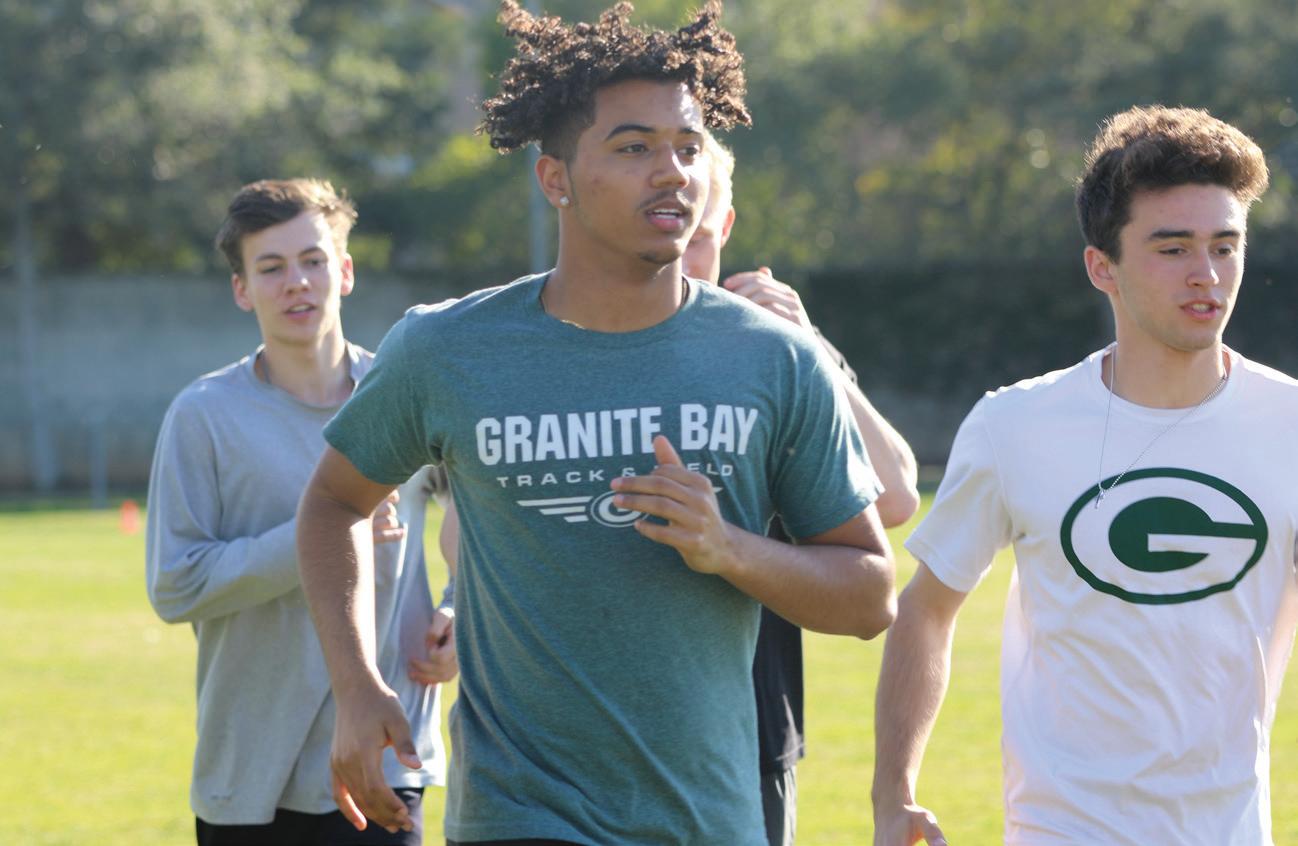
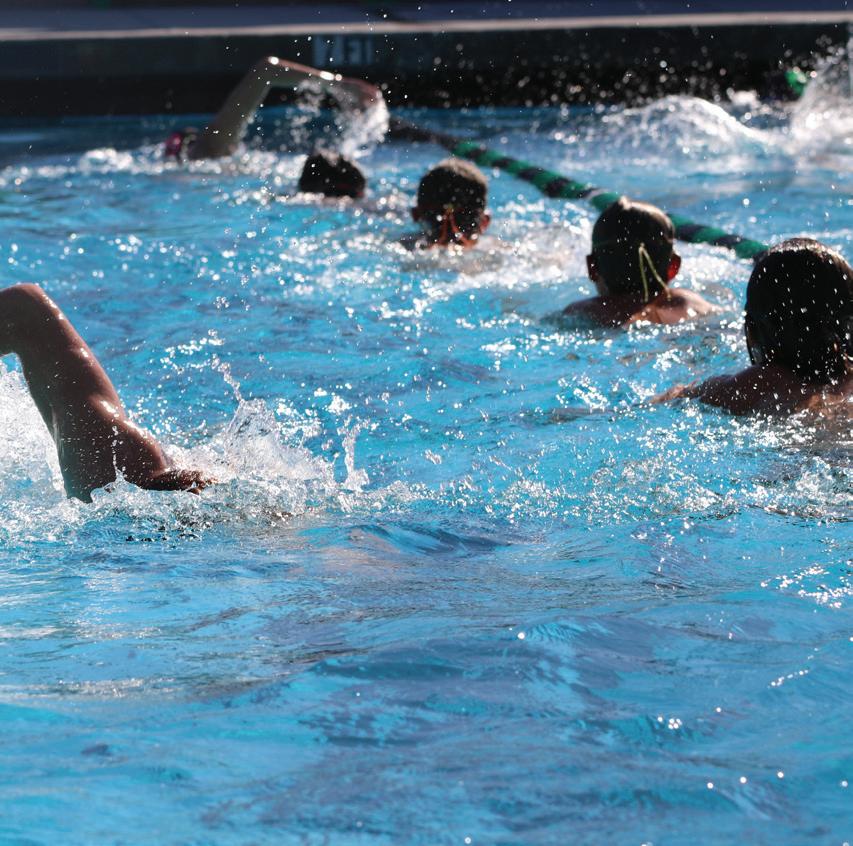
Gazette photo /MAREESA ISLAM
Gazette photo /MAREESA ISLAM
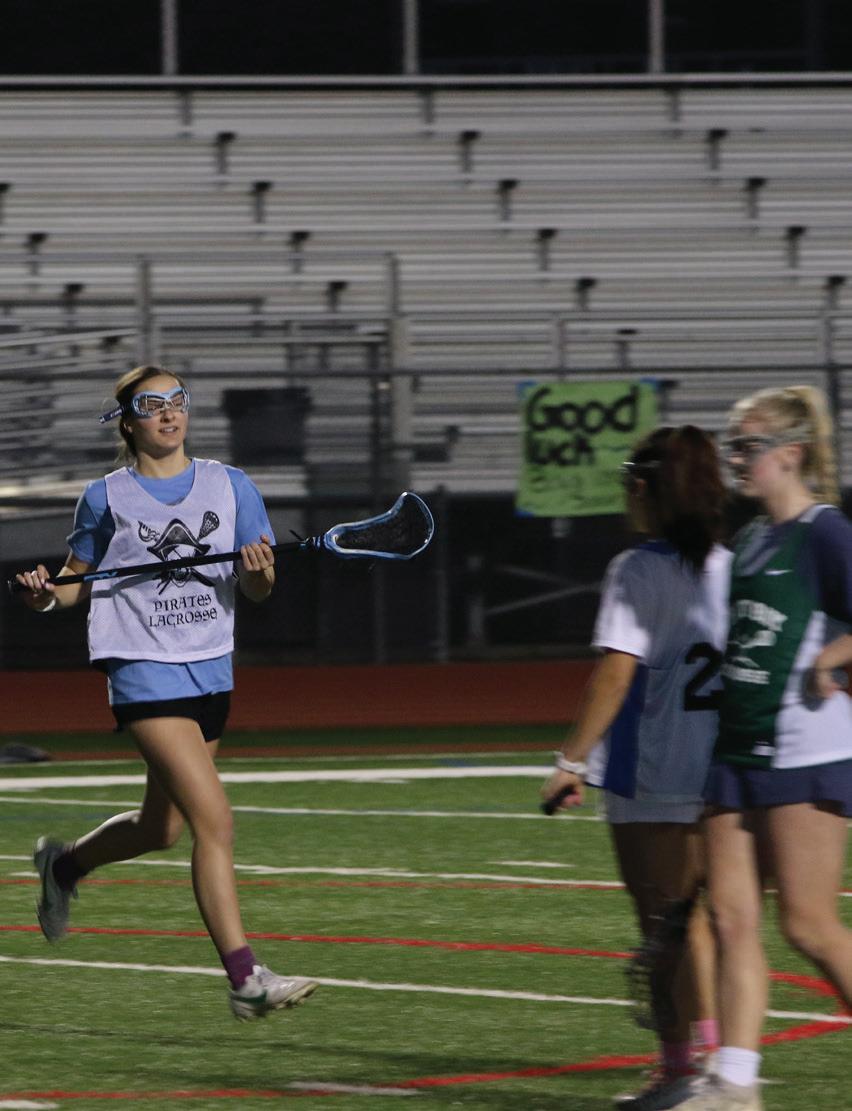

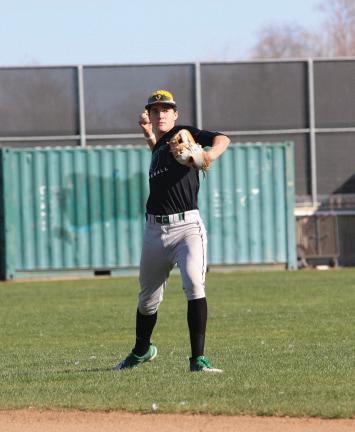
Gazette photo /DARYN CONNER Gazette photo /DARYN CONNER
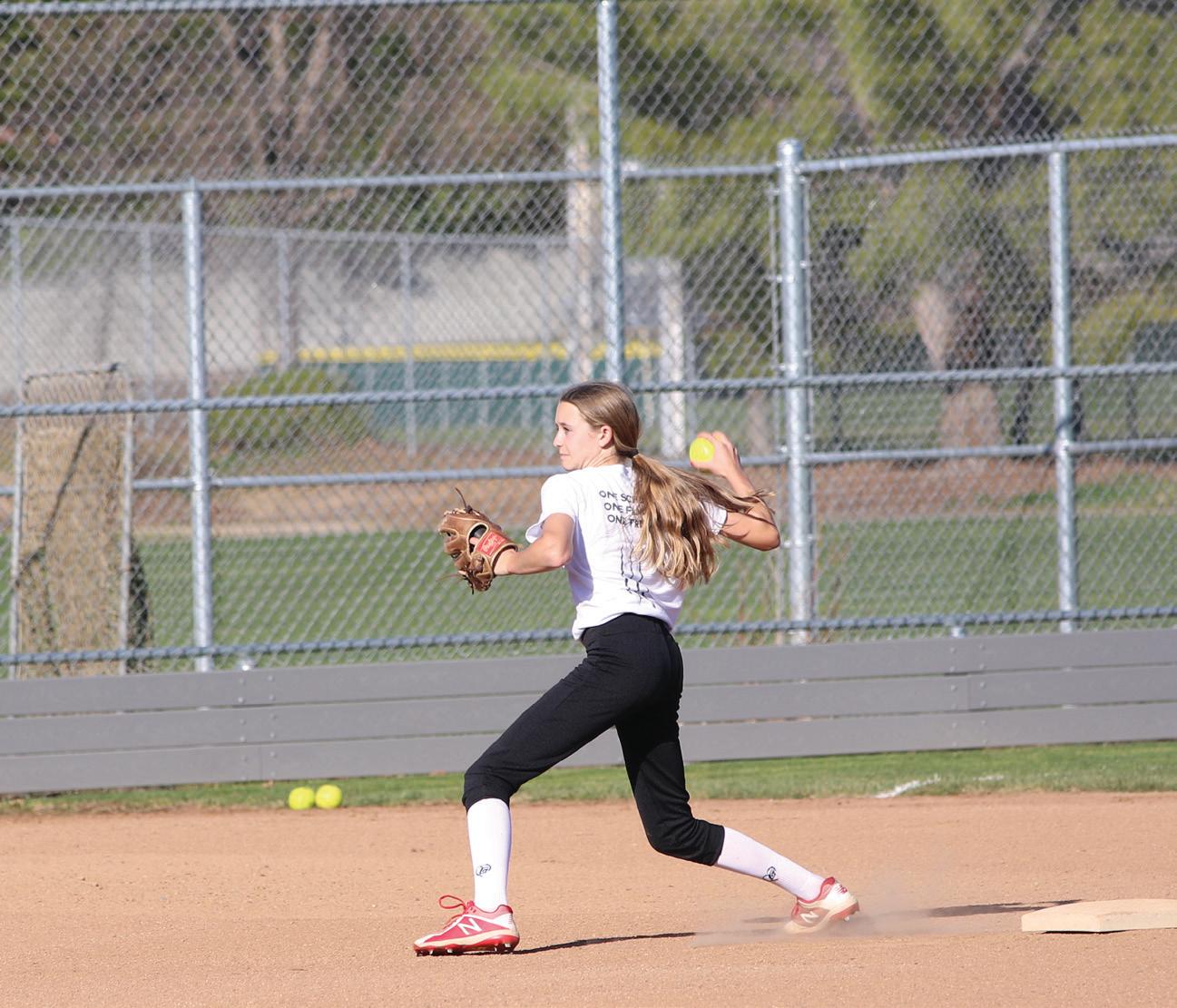

In top left, Leland O’Neal and Brycen Mogensen jog along the field for Track and Field practice. The swim team, top right, practice in their lanes during fourth period athletic P.E. Second row left, Ella Marks, Delaney Johnson, and Ellie Griffin practice for their upcoming season of lacrosse. Freshman Drew McKown, second row right, practices throws on the field for the softball season. Bryse Bentley, third row left, winds up to throw a baseball during practice. Sophie Densham, third row right, practices strokes during fourth period Athletic P.E. The track and field team, bottom left, warm up by jogging along the track. Gazette photo /MAREESA ISLAM
Teachers reminisce on their senior years
GBHS faculty share memorable stories from their own high school years
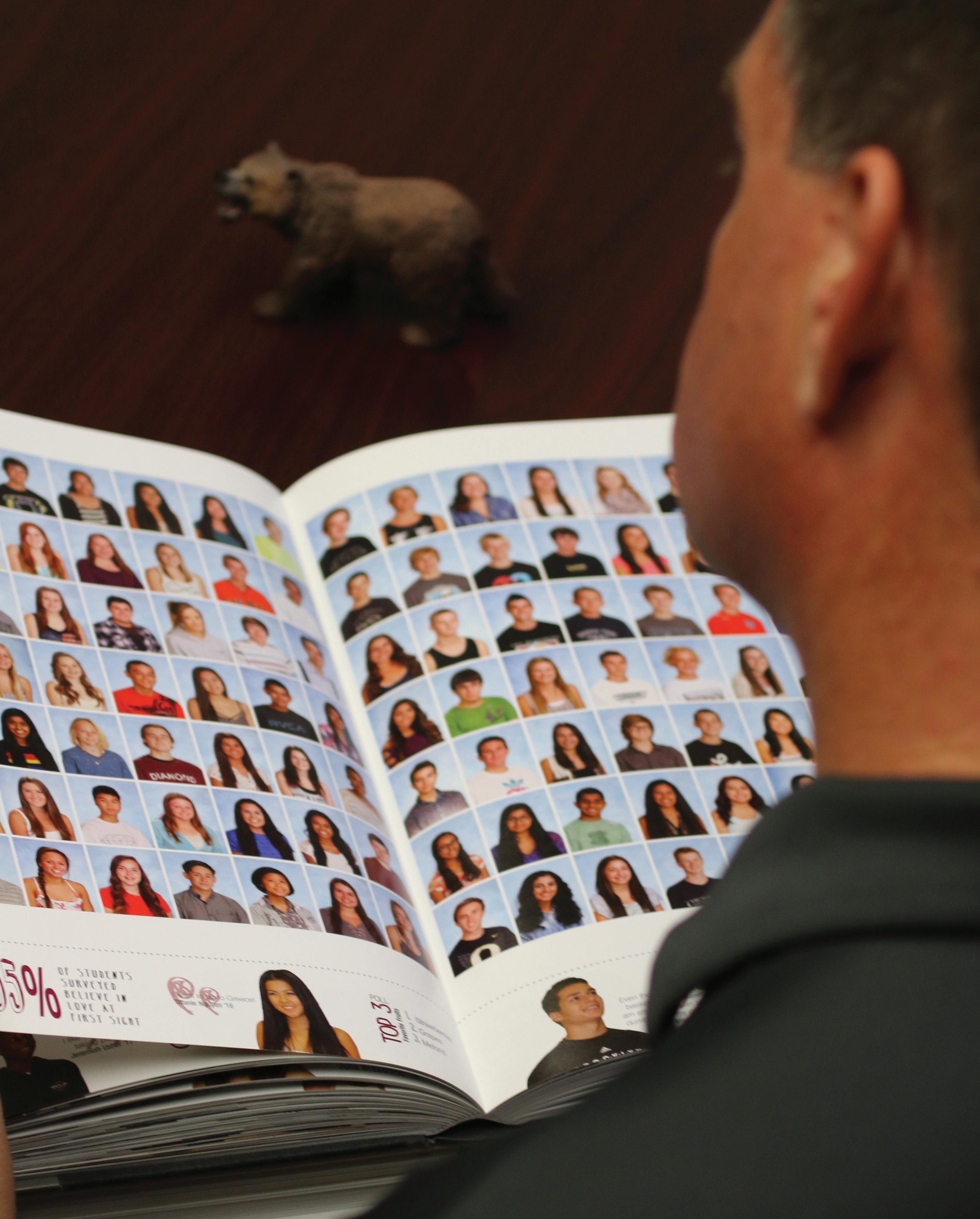
As the semester drags on, the days getting longer and longer, seniors begin to wonder if everything interesting has just been drop-kicked out of existence by the California Department of Education. Calculus just isn’t what it used to be. What ever happened to the epic high school adventures that Disney Channel movies promised? Well, fret not, because there are still a solid three months left in the 2019-2020 school year, a generous period of time for some wild adventures. For those who have already accepted that this year has stagnated and see no possible increase in excitement, don’t be too quick to make assumptions – the senioritis hits hard, but not hard enough to stop all crazy opportunities in high school. Don’t believe it? Just ask some of the teachers at Granite Bay High. “Me and about 20 of my friends decided we were going to be sick … so we went on a skiing trip,” said Advanced Placement U.S. History teacher Brandon Dell’Orto. An alumni of Calaveras High, Dell’Orto recalls how tired he was. He even lost hold of the energy necessary to tie his shoes and brush his teeth. At least, that’s what he said. BY PIPER BACON pbacon.gazette@gmail.com And so, because of this loss in energy, he and his friends started on a 45-minute trip up a hill to their ideal skiing destination. That’s when things started to go haywire. “The (truck) in front of me had four kids in the front seat, because it was the age of seat belts just starting to be required, and three or four kids in the back of the truck, just kind of bouncing around,” Dell’Orto said. It had snowed the night before, so the roads were slick. As Dell’Orto drove behind the truck, it suddenly hit an ice patch and began to spin out of control, going over the edge of the road and smashing against a tree. “As it spun, it threw one of the girls out from the back, and she ended up hitting a tree. The car sat on its side … we all stopped and pulled over immediately,” Dell’Orto said. One of the girls had cut her ear open, causing her to bleed out, however her injury wasn’t fatal. “It looked a lot worse than it really was,” Dell’Orto said. “It was just a blur … so we never went skiing. Nobody did.” Dell’Orto checked up on the girls when they were in the hospital, and they turned out to be alright. Upon going to a Board of Education meeting, for which Dell’Orto was a student representative, he came clean about the incident, only to get chastised by the board members. While neither a fun nor ideal trip, it was definitely something to wake him up in the middle of his senior year. Dell’Orto isn’t the only teacher on campus, however, with some crazy scenarios from their senior year of high school. AP European History teacher Mike Valentine had a run-in with his own life-or-death scenario in the American River back when he was a senior at Cordova High. “The river was high. It was spring, and it had finally rained after two years of a drought … (my friends and I) weren’t paying attention to where we were, and we bounced off a wall,” Valentine said. What seemed like fun for Valentine and his friends during a rafting trip turned out to be more dangerous than they thought. While they weren’t paying too much attention, a different raft came up to Valentine’s, bumping into them and taking a turn for the worse. “We were just humming along … (the other raft) ran into us while we were bounced up against the wall, and the current flipped them,” Valentine said. “All I saw was the raft. I didn’t see anyone in it.” After Valentine watched the scene of the raft flipping over,
Day In The Life From sun-up to sun-down, the Gazette follows the daily routines of two GBHS students
7:29 am After sleeping in an extra hour for collaboration day, Braelyn curls her hair as she begins to get ready for school.
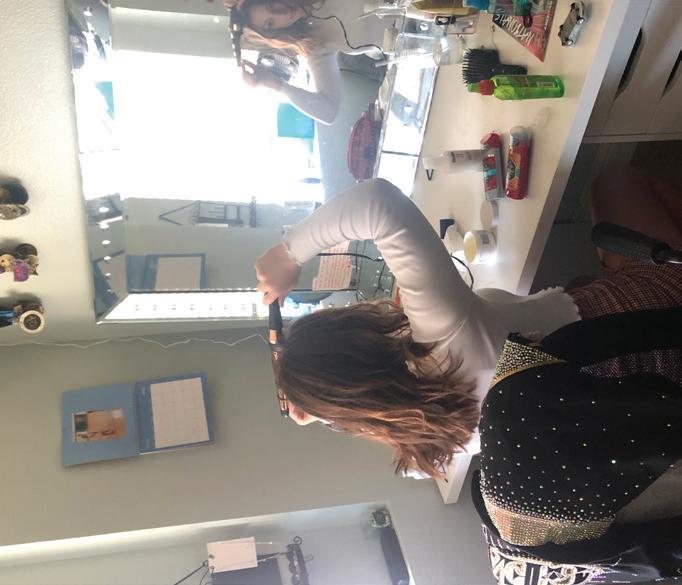
7:00 AM
9:00 AM
7:32 am Before the bell rings, Derek meets in the parking lot with his friend, senior Cade Scribner.
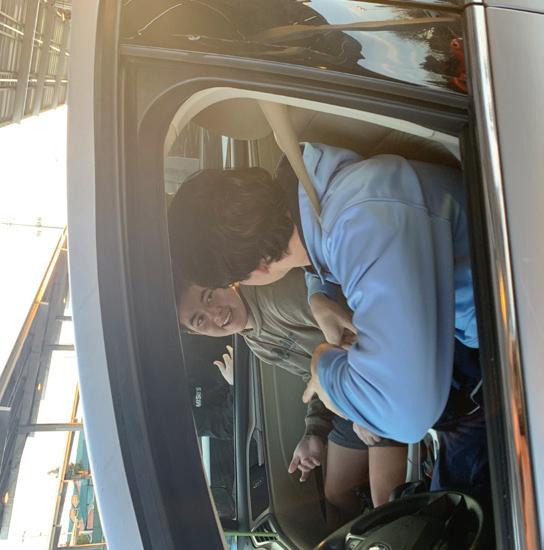
11:24 am Derek heads to his 3rd period Engineering class taught by Mr. Dolan and works on crafting his own skateboard. 12:32 pm In third period Health with Mr. Thomas, Braelyn works on her “True Colors” essay. 11:00 AM
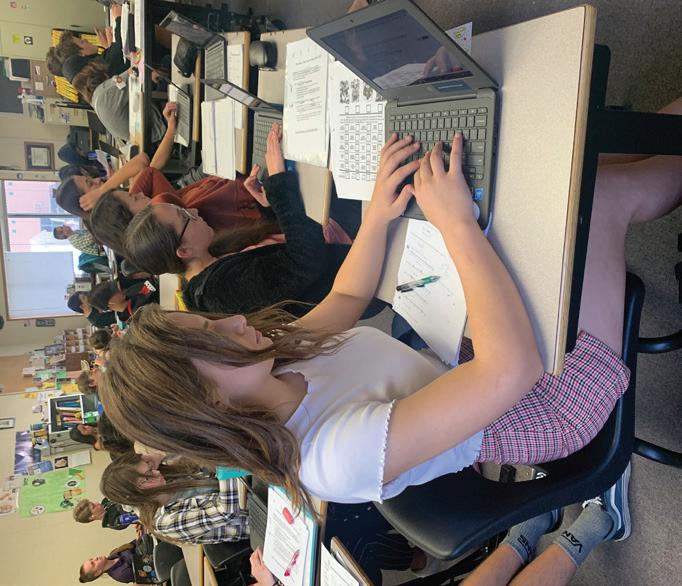
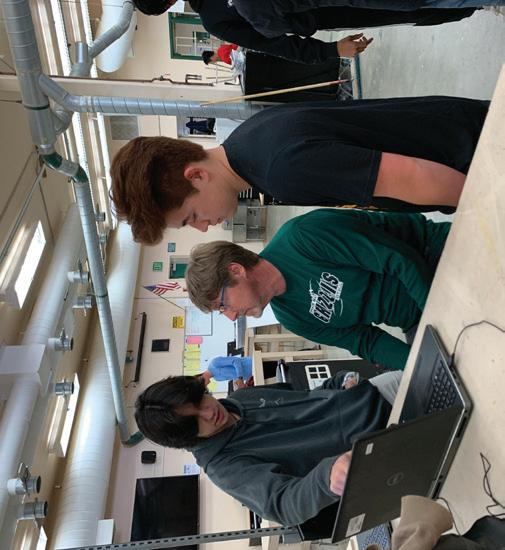
1:00 PM
1:10 pm After leaving school for 4th period off campus, Derek heads to Chick-Fil-A with friends to enjoy lunch.
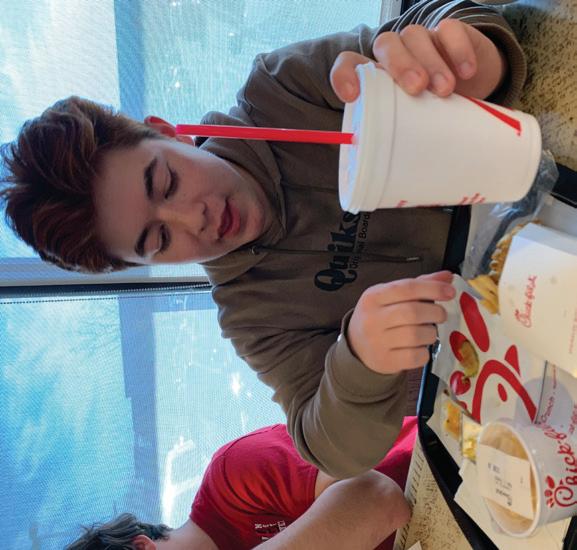
3:26 pm Braelyn heads to Tops Yogurt in Rocklin and spends time with friends.
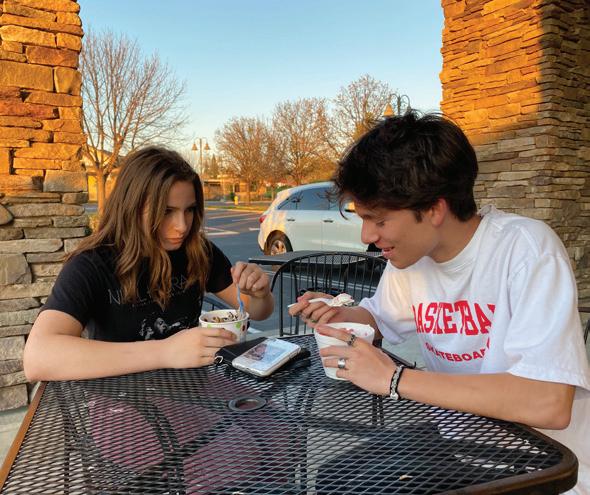
3:00 PM
5:00 PM
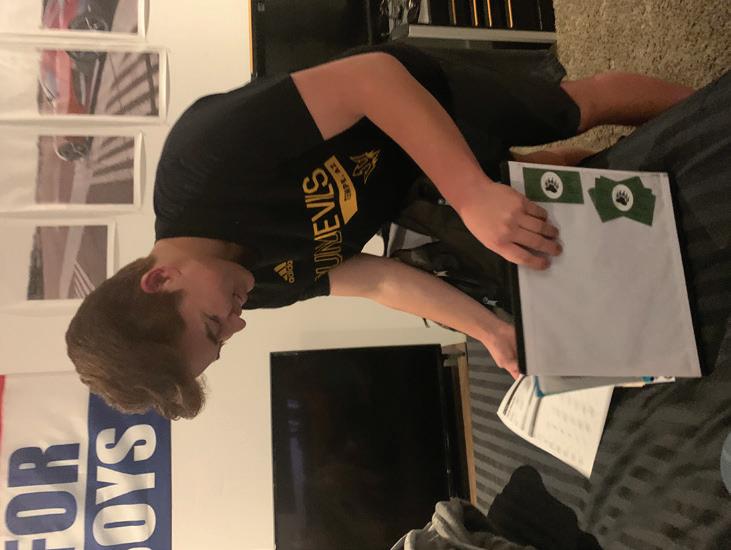
freshman braelyn evans

7:00 PM
8:42 pm Braelyn finishes up cheer practice at Just Tumble by stunting with her teammates.
9:00 PM
7:37 pm Derek gets back home from hanging out with friends for a few hours and starts to work on homework.
senior derek wong
St. Patty’s Day fashion guide
Enjoy these fashion tips to stay ‘pinch free’ this March 17
May your clovers have leaves of four, and may your luck be evermore. The Irish holiday, Saint Patrick’s Day, is right around the corner, or rather, right at the end of the rainbow. Many GBHS students participate in the festivities of Saint Patrick’s Day, and have some fashion tips and tricks on how to not get pinched. “I usually wear green on Saint Patrick’s Day,” junior Aynsley Conner said, “this year I’ll probably wear a green skirt with a sweater or something.” Instead of an obvious statement piece, some students like to be more subtle about their green, wearing only small green accents. BY DARYN CONNER dconner.gazette@gmail.com
“I might wear a green necklace or earrings,” sophomore Katie Nimtz said. “I like to kind of hide my green, so if someone tries to pinch me, I can flash (my accessories) and psych them out.” Some like to be sly, some like to be standard , and some like to go all out. “I’m wearing a green morph suit,” junior Kelly Jones said. “I consider myself very dedicated, so it’s just going to be all green that day.” For those who want to fully celebrate Saint Patrick’s Day, students have shared some of their favorite places to get the best clothes. Party City always has clothes and accessories in every color in every color, so you have a good chance of finding something green there. Unlike people who love to partake in Saint Patrick’s Day,
some feel they are a little too old to play dress up. “I usually forget (to dress up) now that I’m older,” freshman Emily Hopper said, “(and) I gave away all my green clothes from when I was younger.” The excitement of dressing may be gone now, but some students like to think back to their favorite Saint Patrick’s Day fits from youth. “Oh my gosh, it was crazy,” junior Olivia Galvin said. “(In sixth grade) I wore a little green hat, and on that day, I actually found a four leaf clover at school.” Whether you wear green or no green, hopefully your Saint Patrick’s Day brings you endless pots of gold. Remember to tread carefully this year, a leprechaun could be right under your foot. And if you find a four leaf clover, consider it the luck of the Irish!
Gazette illustration/MAYA SNOW



Jamba Juice
wOrder: Razzmatazz wMenu Highlights: Aloha Pineapple, Strawberry Wild, MangoGo-Go, White Gummy wAddress: 8690 Sierra College Blvd #170, Roseville, CA 95661 Quick Take: The Jamba Juice razzmatazz smoothie ingredients are bananas, strawberries, raspberry juice, orange sherbet, and crushed ice, with a sweet taste yet sourish and more of a juicy berry taste rather than just a sherbert. BY JULIETTA GOLOVEY jgoloveygazette@gmail.com

Gazette photo | Julietta Golovey
Starbucks
BY ANGELINA KOLOSEY akolosey.gazette@gmail.com
wOrder: Grande pink drink with almond milk, add peach juice, add banana, 2 pumps creme base, blended. wMenu Highlights: Nitro Cold Brew, Coconut Milk Latte wAddress: Starbucks 7082 Auburn Blvd #150, Citrus Heights, CA 95621 Quick Take: A customized smoothie drink mixing a well known drink, the pink drink, with some fruit and fruit juice to get a classic strawberry banana smoothie taste.

Gazette photo | Angelina Kolosey
wGenre: Indie rock / Postpunk wProducer: Danger Mouse wSkip To: Before the Water Gets Too High Quick Take: On “Wide Awaaaaake!”, Parquet Courts packs their fiercest social commentary to date with smooth, catchy tracks guaranteed to leave whoever crosses its path with a mark. With its heavy inclination towards politics, the record is easy to listen to BY JJ HILL jhill.gazette@gmail.com
Rough Trade Records
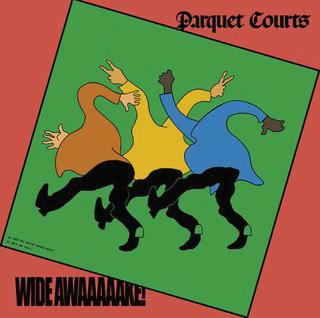
but hard to digest. Whether it resonates or not is a choice left to the listener.
“Rare” by Selena Gomez
wGenre: Pop wProducer: Interscope Records wSkip To: Dance Again Quick Take: Selena Gomez hasn’t made a bad album, and she isn’t about to start now. With her last album, “Revival” being released in 2015, the nearly five year wait for “Rare” was worth it. An album practically oozing with self-awareness and growth, “Rare” appears to be BY BELLA KHOR bkhor.gazette@gmail.com
Interscope Records

a collection of songs with lyrics that reflect upon events from the last four years of her life.
Little Women
wLead Actors: Saoirse Ronan, Timothee Chalamet, Meryl Streep, Emma Watson, Laura Dern wDirector: Greta Gerwig wFavorite Moment: The scene where Amy talks about art and an “economic proposition” or the surprise ending. wPlot Summary: Four ambitious young women come of age. Quick Take: Humanized, emotional, and necessary portrayal of people. BY ASHLEY YUNG ayung2.gazette@gmail.com
IMDb.COM
Birds of Prey
wLead Actors: Margot Robbie, Ewan McGregor wDirector: Cathy Yan wFavorite Moment: Ewan McGrogor’s performance as Black Mask. wPlot Summary: Harley Quinn and the Birds of Prey find their independence as everyone in Gotham City conspires against them. Quick Take: Birds of Prey is a refreshing take on the comic book genre, combining stunning visuals with a great cast of BY BRENT EVANS bevans.gazette@gmail.com
characters in one of DC’s best films in recent memory. IMDb.COM
Say YES to the dress! Several GBHS juniors begin to pick out their dresses for the upcoming Junior Prom

Gazette illustrations/ KATE FERNANDEZ

This year’s Junior Prom is coming up on March 21st, and the stress to find the perfect dress is something every highschool girl goes through. Like most teenagers, junior girls like to buy dresses from their favorite or most popular stores in town. “My dress is from white fox boutique,” junior Camille Garcia said, “It’s always been one of my favorite stores so I’m not surprised I ended up getting my dress from there.” As they are opposed to the common stores, some juniors like to think out of the box and buy from stores they normally wouldn’t. “I’m getting my dress from (a website) in England because I thought I would have a better chance of no one else having it,” junior Kayla Morotti said. Buying from stores is usually the way students go to get a dress for junior prom, but many seniors sell or rent their dresses from previous years. BY DARYN CONNER dconner.gazette@gmail.com
LED LIGHTS
LED lights in bedrooms with remote control with several colors are on the rise. These lights are usually put on the top of a ceiling lining a room, and are a great way to make your room a little brighter. Gazette photo /LINDSEY ZABELL Instead of buying new, junior Grettel Sainz is renting her prom dress from a senior friend. “I’m renting from my friend because I know no one else will have it and I can save a little money,” Sainz said. Buying, renting or borrowing are what most high school girls choose to do for Junior Prom, however, a few artistically talented students make theirs. “I’m really interested in fashion, and I thought it would be cool to use junior prom as an opportunity to make a dress,” senior Meryl Isaacson said. Along with the method girls use to get their dresses, the stress of how everything will turn out is always something people worry about. “I’m scared for my dress to come because I never know what it’s going to look like until I see it in person. Sometimes it doesn’t always look how it does online,” Garcia said. In addition to how it will look, Morotti is still hoping she will even get the chance to wear it that night. “I ordered mine from like a different country, so I don’t know if it will make it here by Junior Prom,” Morotti said, “I’m not too worried but it’s always in the back of my mind.” Even though Grettel has a unique dress from a friend, she still has doubts that someone else might have it. “Sometimes you think that someone might have bought it last year when they saw Scossy wearing it,” Sainz said, “Its kind of dumb to think that but I still do.” For Meryl Isaacson, there is extra stress because her dress is in her hands. “I’m using a trial and error method since I don’t have a (sewing) pattern, so I just hope I don’t mess up, because if I do, it will be too late to buy one.” Isaacson said. Whether you buy, rent, or create, hopefully your junior prom is a night to remember, and your dress is even better.
HAIR COLORING
A popular way to spice up your look is with some hair dye. Recently, many students have begun to dye their hair with natural ombre colors, or even with unnatural colors such as pink or blue.
LULULEMON
In recent years, the clothing brand Lululemon has gained popularity among many students. They are known for their comfortable leggings and unique patterns.
Snapchat, a popular social media app, has experienced a decline in popularity W hen it comes to social media apps, Snapchat ranks in at one of the most popular in the world next to Instagram and Facebook. Snapchat is different though, as unlike Instagram and similar apps, Snapchat allows and encourages users to send messages through photos and chat rooms rather than just sharing photos for likes and comments. Every app has its niche that attracts its users to keep coming back to it. For Snapchat, this thing is called a Snapstreak. A Snapstreak measures how many days you have texted with one person in a row, encouraging users to keep logging onto the app each day. Streaks have been around since the app originated, yet as the app grows older, more and more people have stopped worrying about keeping them. “Sending streaks is kind of out of style,” senior Ethan Case said, “if I snapchat a person everyday and start a streak with them it’s fine, but if it’s not natural then I won’t go out of my way to keep it.” Many users customize their streaks with drawings, different filters, emojis, and phrases to spice their daily photos up. However, this has become less common because of the change in popularity of sending streaks. “I still send streaks but they just look like regular photos,” said Bella Gennuso senior at Granite Bay High School. “I used to customize streak photos but I don’t anymore.” Snapstreaks aren’t the only incentive that Snapchat conveys to their users, as it also gives all of its users a Snap Score. A Snap Score adds up all of a user’s sent and received messages and photos since they signed up for the app. “A person’s snap score can tell a lot about a person,” senior Ean Mayhew said, “depending if it’s high or low.” There’s no doubt that Snapchat will maintain it’s broadened popularity throughout the world. However, it is questionable if streaks will survive the newest updates. BY DYLAN ROWE drowe.gazette@gmail.com Gazette illustration/KATE FERNANDEZ

...Hello Houseparty GBHS seniors have brought back a previously popular app to group video chat again
BY MAYA SNOW msnow.gazette@gmail.com
The popular app “Houseparty” made it’s rise back in 2016 when the senior class was just starting high school. But now, since the beginning of 2020, students have been redownloading the app. A group of 12th graders have started using Houseparty as a form of communication again. Senior Ean Mayhew said that he uses the app everyday to talk to his friends. “I like houseparty more than Facetime because it is easier to navigate and invite friends,” Mayhew said. This downloadable application is safer than giving out personal information too. “I also like Houseparty more because I can give people my username rather than my actual phone number,” said Mayhew. This group of friends uses Houseparty almost every day, and they make sure to keep the ‘streak’. “We keep the streak by going every night and earning points” senior Derek Wong said.
The app is used for entertainment,
but it is also used to help students with their learning process.
“My friends and I love to go to Houseparty every night. We all talk while doing homework, and it is nice because we can help each other if we have questions on assignments,” Wong said. Some of these same students would also use the app back in 2016. “I (used to use) the app to talk to my friends while we played video games together freshman year,” senior Bella Gennuso said. Since then, Houseparty has made its comeback into the Granite Bay community. “I have been using Houseparty almost everyday this year, and I don’t see myself stopping anytime soon,” Mayhew said.

Gazette illustration/MAYA SNOW
Freshman vs Senior: What social media do you use most? How long per day?
Compiled by: Dylan Rowe
I use Instagram the most, for probably 4 hours a day.
I use Snapchat most of the day. I use it for at least 3 hours.
Gazette Page 28 Granite Bay Gazette wFriday, March 6, 2020 MEMORIES: History teacher saved woman’s life as a teen 137740 Continued from page 22 he didn’t see anyone until a man surfaced from the rushing currents.The only thing the man told them to do was to “get the old lady.” “I didn’t see anybody,” Valentine said. He recalled not being able to see anyone, until a girl in her early 20s came up from the water. “I reached down, and (my friend) and I started pulling her up, but we still didn’t know where the (old) lady was,” Valentine said. “She was under the raft, and the raft had been flipped upside down.” Valentine quickly realized that the older woman was drowning. Three of his friends, who were all big guys with Valentine being the smallest of them, dove between the rafts to get to the woman. “By now, we were going down the river while trying to get the raft off, and she’s yanking them down,” Valentine said. “She was panicked, turned upside down and turning blue.” There was a struggle to get to the edge, but they managed to make it on time, Valentine and his friends leaving this adventure with their heads held high, knowing they’d just saved a life. As crazy senior years go, GBHS teachers are no strangers to the concept of wild life-threatening situations or even weird little things to happen throughout the day. Science teacher Lisa Goldsmith has her own list of crazy stories from her senior year. Some of it was small and funny. She took up the opportunity of senior ditch day, though it didn’t go quite as expected. “I went to the local lake with my best friend,” Goldsmith said. “We were swimming and I ran into a dirty diaper floating in the lake.” Her other experiences were a bit shocking, to say the least. “The power went out and I was in the library. I left to go to the bathroom, and when I came back out, a bolt of lightning struck the power lines next to the building,” Goldsmith said. Her friend Vince had watched the scene from afar, calling it “too close for comfort.” “Long story short, I was almost struck by lightning,” Goldsmith said. With all this happening in just a few teachers’ senior years, it’s not impossible for some wild memory to come out of any day in this final semester of high school. So, the best thing for seniors to do instead of succumbing to senioritis is to just keep their heads up and look for new, exciting opportunities. Who knows, they might just save a life. Even if it’s the last day of school and it seems like nothing exciting has happened at all, don’t worry – graduation isn’t even the end just yet. “At graduation, when we threw our caps in the air,” Goldsmith said, “I watched mine – and it hit my friend Chris in the eye.”
SMART IS THE NEW SEXY.



PRINT DIGITAL TODAY TOMORROW Be able to find Iran on a map. Know what the city council is up to behind closed doors. Find out how to make an icebox peanut butter pie from scratch. Get it all in the newspaper, print or digital, because a little depth looks great on you.

NEWSPAPER THE
GET IT
GRANITE BAY HIGH SCHOOL 1 GRIZZLY WAY GRANITE BAY, CA 95746 GAZETTE Granite Bay
Senior Editors: Cori Caplinger Bella Khor Angelina Kolosey May Lin Dylan Rowe Ashley Yung Lindsey Zabell
Assistant Editors: Piper Bacon Heba Bounar Sophie Criscione Shreya Dodballapur Kate Fernandez Emerson Ford JJ Hill Mareesa Islam Ashley Lucia
Afew weeks ago, when I came home from school, my Mom was crying. Frantic, I asked her what was wrong, to which she replied that my dog was going to die. Usually people have time to prepare. Usually, it’s a matter of years, not hours. But that wasn’t the case when I came home that day. In short, my dog needed to be put down, and she needed to be put down soon. She had rapidly growing masses on her liver and spleen, internal bleeding, a heart murmur and likely a plethora of other undiagnosed illnesses. It seemed impossible. Just two days before she had been completely fine, leaping onto my sister’s bed and jumping eagerly at the sound of her leash. But the night before she had been off. She refused to get up from her bed and would barely lift her head. Rightfully worried, my parents brought her to the vet, where they received her diagnosis. Our dog, whom my family loved more than anything, had reached the end of her life. Perhaps more than anything else, this event made me aware of just how little time we have with the animals we cherish. These animals can become as important as any other family member, yet they will pass in a fraction of the time. To me, my dog was a part of my family. In her eight years of living, she had become more like a sister to me than a pet. More often than not, the grief that results from the death of a pet is dismissed by society. Since they are animals, the pain that results from them passing isn’t usually taken seriously. But the grief that my family and I felt was incredibly real. She might have been a dog, but we mourned her nonetheless. You never know when a loved one will pass, and for that reason the time you have with them is incredibly valuable. Make every moment worthwhile, because you never know when that moment will end. *** Kate Fernandez, a senior, is an assistant editor. The loss of loved ones can have brutal impacts on relatives COMMENTARY kate fernandez kfernandez.gazette@gmail.com
Illustrations Editor: Juliette Golovey
Staff Writers: Daryn Conner Ria Dhamejani Brent Evans Alexandra Juell Rebecca Nolan Sean Turner

Administrative Assistant: Andrew Martinez
Adviser: Karl Grubaugh
The Gazette is published eight times per academic year by students in the advanced journalism class at Granite Bay High School. Content is determined by the staff and does not necessarily reflect the opinions or policies of Granite Bay High School’s faculty, administration, adviser or student body. Students are protected in their exercise of press freedom by the First Amendment to the Constitution of the United States and California Education Code 48907. Signed editorials and columns reflect the views of the writer. Letters to the editor and guest commentaries are encouraged and must be signed, although anonymity can be granted on a case-bycase basis. The editorial board reviews letters to the editor, advertising and guest commentaries and reserves the right to edit and refuse material. Reasons can include length, clarity, libel, obscenity, material disruption of the educational process at Granite Bay High School or violation of copyright laws.
Identification Statement GRANITE BAY GAZETTE PUBLISHED EIGHT TIMES PER ACADEMIC YEAR c/o Granite Bay High School 1 Grizzly Way Granite Bay, CA 95746
Gazette illustration/CORI CAPLINGER A s an active student with involvement in a multitude of programs at Granite Bay High, I never thought the attendance window would be one of the largest obstacles to my own success and wellbeing as a student. I don’t skip class. I don’t not try. And I don’t not care. I do have existing health conditions. Yet each time I approach the attendance window, or they confront me, I find that each of these components of myself is scrutinized. Preconceived judgments of students outweigh their clarity in response to anyone. Even with a chronic-illness form on file, I have found that some still find ways to question my condition and therefore issue me a truancy. Truancies only multiply as they dictate what is considered excused and unexcused. Just last week, I was told I needed to write “paragraphs in an e-mail detailing my exact symptoms” each time I was ill due to the “number of my absences.” If you do not have a medical background, why should you question the nature of my health? Even though I have maintained strong academic performance despite my obstacles, a truancy still is indicative of my achievement here in their minds. California Education Code 48205 outlines when a student may be legally excused from school and includes both illnesses and medical appointments. These are a few examples of excusable absences protected under the education code, and may not be deemed truancies. Yet, for many students these guidelines are not upheld. It has taken me these past four years to realize I am not the only one who has been misunderstood, unheard and overlooked. Countless students have faced the same battles with those who enforce policies not representative of all – and something needs to change. I understand having stricter policies, but not at the expense of our well-being. One of my close friends had untreated appendicitis for months, trudging to class every day in extreme pain – why? Because of the attendance policies. Four months later, her appendix ruptured on a Monday and surgeons were unable to comprehend how she endured the pain for five days before she was finally rushed into the emergency room. That is unheard of – and sadly, GBHS is at least partly responsible. Now two months later, after a multitude of infections and other complications, she was released from Stanford Children’s Hospital with a long road to recovery – and guess what. She was welcomed home by a multitude of messages from the GBHS attendance office notifying her of her excessive absences and truancies. The attendance office had been notified of her condition countless times – but she had been misunderstood, unheard and overlooked, just like the rest of us. Had the policies not been so extreme, she would not have attended school during those episodes of extreme illness and therefore could have reached a diagnosis sooner. The only reason she pushed herself beyond her reasonable limits was because “they made it clear (she) couldn’t have another absence.” Thank you, attendance bureaucracy. Limitations on the number of absences a student can receive are based on periods rather than days. You catch a sickness and are out for one day – that’s four absences. Reach nine, and things get really tough. These are state guidelines, and GBHS does not make the policy. However, it would not hurt staff members to conduct themselves in a manner that is sympathetic to all students. They don’t know exactly what challenges an individual might be facing, and rather than blaming them, asking about their well-being should be a priority.
I constantly find myself stressed and overwhelmed by the attendance standards. I have forced myself to school countless times when I struggled to muster the strength to walk, suffering from debilitating weakness. Many students work extremely hard, and although they cite losing funding as a reason for their intense scrutiny, these same students make GBHS the reputable academic institution it is. Without our strong teachers and our own hard work, the school would not yield the results it has. Students are valuable. We do not deserve to be misunderstood, overlooked and unheard. *** Ashley Lucia, a senior, is an assistant editor. Lack of empathy causes stress Attendance policies fail to recognize special circumstances
COMMENTARY ashley lucia alucia.gazette@gmail.com
Voices Page 30 Granite Bay Gazette wFriday, March 6, 2020 I want to preface this by making it clear that, no, I am not a drug user. The most I’ve ever been under the influence was probably when I was around 5 years old, taking cold medicine for the first time. Boy, was that a trip. Gotta love that NyQuil. However, just because I personally choose to not do drugs, be it because of concern for my own health or in fear of my mother, does not mean that I am against drug use. What I am against is government intervention in terms of drug use. There are a few exceptions to this belief. Drugs that induce violence, or drugs that more than likely result in a one-hitKO, should be illegal for the safety of the general public. This includes substances such as methamphetamine, heroin and the notorious “gray death” – a fun combination of heroin, fentanyl and carfentanil that can lead to a quick death after just one dosage. If a substance can cause you to lash out and harm others, or if it can kill you after just one dosage, then I fully believe it should be illegal due to its hazardous nature. However, making all drugs illegal isn’t going to stop the public from abusing those drugs – it’s just going to get otherwise innocent American citizens thrown in prison. Besides, I fully believe it is not the government’s business to prevent people from doing what they want with their lives if they aren’t an immediate danger to themselves and those around them. I understand this is a thin line to walk, and a very large gray space that is difficult to navigate. I’m not going to deny that.
I’m also not going to deny the impact that substance abuse can have over a person’s life. It’s terrible.
However I do not agree with throwing addicts in prison for only hurting themselves.
If a person is addicted to some sort of substance,
throwing them in prison and ruining their life is not the answer.
Those who are addicted to any sort of substance deserve a second chance in life and should go to rehabilitation and recovery centers. Now if they do end up hurting others while under the influence, that’s a whole different story, but that’s not the issue I’m arguing here. I’m also not talking about driving while under the influence, either – that is illegal and should remain so because it is a hazard to the safety of others.
If we’re trying to prevent people from harming others while under the influence, then the government should also make alcohol illegal. They already tried, and failed. One of the reasons why prohibition was put into place to begin with was because of the increase in domestic violence across the nation. Prohibition made the issue worse by making alcohol illicit. Illegalizing drugs won’t make the drugs go away, it’ll just make common drugs less safe and, once again, get everyday people thrown in prison. In the end, it is up to citizens’ life choices to determine whether or not they abuse a substance and suffer the long-term consequences. It’s not like America doesn’t educate children on drug addiction and abuse. While in many places, it could be better, that’s a different issue. Even still, according to the National Institute on Drug Abuse, one of the most commonly abused drugs are simply over-thecounter, everyday medications. This isn’t common knowledge. And so, the majority of citizens getting criminalized for doing drugs are those who live in lower-income communities, getting something put on their criminal record for the rest of their lives for a mistake they could’ve made in their youth. Not only are they suffering, but American tax dollars are constantly going toward persecuting and imprisoning average people for choosing to do drugs. Not to mention that this war on drugs, while supposedly unbiased, does have a tendency to target people of color from lower-income communities. For reference, Black and Latinx Americans make up 47% of the total percentage of people arrested for drug law violations. These Black and Latinx citizens, being incarcerated for potentially one instance of illicit drug trafficking or possession, are now left with that mark on their criminal record for the rest of their lives. This will later hold them back from getting a desirable job, and likely prevent them from moving up in their workplace because of one infraction. From my perspective, legalizing what are now illicit substances isn’t even a party vs. party debate. Both sides of the political spectrum will benefit from the legalization of more drugs. On one hand, our tax dollars won’t go to fund something that will potentially never be stopped. On the other, fewer people of color and those living in lowerincome communities will be at risk for incarceration and a mark on their criminal record. Many of the people getting arrested for drug use aren’t evil people. They’re not criminals. They’re people taking their own lives into their hands. And that is their choice.
*** Piper Bacon, a junior, is an assistant editor. Non-harmful drugs should be legalized Substance-users should not be hindered by bureaucratic laws Gazette illustration/KATE FERNANDEZ COMMENTARY piper bacon pbacon.gazette@gmail.com


Libtard!” “Racist!” “Snowflake!” “Idiot!” Last month, at Pres. Trump’s State of the Union, address we saw Donald Trump deny Speaker of the House Nancy Pelosi a handshake, in addition to Pelosi tearing President Trump’s State of the Union address in half. I didn’t know that so many politicians had never graduated from kindergarten. Politics has always been a bit childish. From the very beginning of American politics, politicians have been throwing around insults and cruel names – and they’ve had just as many thrown their way. But that doesn’t mean it’s ever been OK. No matter who you support, it’s troubling to see how Washington, D.C., has become more and more polarized throughout the years, to the point that there seems to be little respect for people on both sides of the political aisle. Not only Washington, D.C., but almost all of America has seemingly gone out to the political edges. With Twitter and YouTube especially, users can anonymously share their feelings, and as a result I’ve seen so many horrible political arguments break out. “You’re so f------ dumb!” “Drink bleach, libtard!” “Die in a hole, you racist hillbilly!” We’ve reached the point where a lot of people just want to hurtle insults at those of different political views, as if it’ll cancel out the anger of another uninformed and delusional extremist. Not only that, but we’ve reached a point where it’s considered OK to insult people openly. That’s what makes me worried for our future as a country. In modern America, it seems as if a rather large proportion of people feel the need to be red or blue rather than a mix of the two. Many people refuse to even have friends or significant others of different political beliefs, as if those people can’t possibly be good, honest human beings.
As we get more blue or more red as
individuals, it becomes increasingly difficult to have a productive conversation about politics. Politics have become like a religion where
we feel that we must convert people to our beliefs in order to save them from themselves. We all like to assume that our beliefs are the right beliefs, that everyone else is wrong and just doesn’t understand the truth. Well, that’s ridiculous. Everyone needs to try and understand the beliefs expressed by other people instead of trying to change them. I used to be the type of person who felt self righteous in my political beliefs, until I realized that it’s not worth it to make foes for the sake of being “right.” The only way American citizens will be able progress and change for the better is if we stop acting as if the opinions of people we disagree with don’t matter. The Washington Post said it best: “Democracy dies in darkness.”
*** Ali Juell, a junior, is a staff writer. Many modern politicians lack maturity The current political spectrum is completely overridden with contentious and immature officeholders Gazette illustration/KATE FERNANDEZ COMMENTARY ali juell ajuell.gazette@gmail.com
Voices Granite Bay Gazette wFriday, March 6 , 2020 A s technology moves forward, we see advancements in many areas, but one area has had a radical change in recent years: the popularization of fully electric cars. Companies like BMW, Volkswagen, and Tesla have released very successful electric cars, and these cars are often praised for their environmental friendliness and cheap recharges. However, enthusiasts in the car community have been very apprehensive toward the new technology. Though this is not the opinion of all in the car community, countless online forum posts can be found on why electric cars are inferior. However, as an enthusiast myself I believe the opposite. I think that electric cars are merely the next step in motorsport, and shouldn’t be met with disdain but rather with interest and excitement. Though not as developed yet, I believe that electric vehicles will break past the limits of combustion engines with ease. Fully electric cars bring several performance advantages traditional cars lack such as instantaneous torque, improved weight distribution, and the lack of a transmission. Prototype electric race cars such as the Wolkswagen I.D.R. have broken track records set by some of the fastest traditional cars. But most importantly of all, I think electric cars are the only viable solution to keeping motorsport alive as the world necessitates a fight against global warming. Climate change is the most pressing global issue and cars are one of the largest contributing factors. Change is a necessity in any sport, but if the racing community embraces electric cars now, that doesn’t need to be a negative thing.
*** Sean Turner, a senior, is a staff writer. Electric cars should not be judged New technology begins to save the environment B y now, many are aware of the Coronavirus outbreak in China that happened early in the year. The coronavirus is a kind of common virus that causes an infection in your nose, sinuses and upper throat, much like other colds. However, this new type of virus became notorious because of the sudden fatality rate. But here are some other statistics for you as well. More than 1.25 million people die in road crashes every year, averaging around 3,000 deaths a day. One person dies every 37 seconds from cardiovascular disease. You have more of a chance of getting struck by lightning than dying from this disease. But do those figures keep you from going outside or actively try to lower your risks? Probably not. In fact, if I’m solely focusing on the statistics, we’ve got it all wrong. Shockingly, a lot more people are getting second-hand symptoms from the virus and the numbers are increasing at a faster rate. The new disease is called xenophobia. Don’t get me wrong. I’m not dismissing any of these numbers by any means. However, the reason I brought this up is because I’ve experienced and seen a lot of xenophobic rhetoric and racism going around. False information including warnings to avoid Asian foods, videos accompanied by inaccurate speculation about the cause of the virus, and dehumanizing comments that have gone viral. If you’re not going to use your platform to spread prevention information and instead just joke around assuming that anyone who’s Asian has the Coronavirus, then get off. I wish I was being too sensitive, but the aftermath of this racial hatred has gone too far. For example, there’s been a decline in business in Chinatown in San Francisco that coincides with an uptick in xenophobic attacks against people of Asian descent around the world. According to the Guardian, “People are refusing to be served by Asian people in shops … a woman was thrown off a train because she was Asian. … This adds to the racism and stereotypes about the Chinese that already exist.” Families are getting torn apart and hundreds are dying. In China, doctors are working hours on end, trying to combat this virus to the point where their masks are imprinted onto their faces and multiple physicians have collapsed in the middle of treatment due to the exhaustion. Yet, despite this courageous and resilient effort everyone should be looking up to, we point to them as a laughingstock and use it as an excuse to pour out hatred for another race. This hasn’t happened just once. The same racism rose with the Ebola outbreak. My point is that occasional jokes are fine, but don’t take it to the point where you’re contributing to the stereotype issue. The University of California at Berkeley, one of the top schools in the country, even posted “common reactions” to the Coronavirus including anxiety, helplessness, social withdrawal and xenophobia. When is xenophobia ever a normal reaction? China, where the virus originated, is still working to fight the virus and support each other during these tough times and yet, halfway across the world, people are tearing at each other with anti-immigration messages and strong prejudice. Ironic, is it not? *** May Lin, a senior, is a senior editor. Xenophobia is based on stereotyping Racism still remains prevalent
COMMENTARY may lin mlin.gazette@gmail.com COMMENTARY sean turner sturner.gazette@gmail.com
on
the BAY HEARD
Who is a woman you look up to or admire?
“Definitely it would be my mom because she does a lot. She has three jobs and she’s a single mom.”
cole resendez freshman
“My mom because she’s always been there and taking care of me since forever and helps me with anything.”
talon nimi sophomore
“A woman I look up to is my older sister, Katelyn Fernandez, because she’s always there for me.”
karly fernandez junior
“The woman I admire most is definitely my older sister, Victoria. She taught me everything I know.”
It’s time to shift politics to younger people T he importance of introducing politics to children at a young age tends to fall on the shoulders of parents and teachers, but what we fail to realize are the consequences on relying on parents to educate their children about their political views. This habit has instilled a reliance on parents by their children to formulate similar political views, often identical to those of their family, ruining what would be an amazing and enlightening opportunity for students to research and educate themselves about politics and come up with their own views without influence from outside parties. Politics are a touchy subject in the school environment, but it needs to be more common. We should think of the school environment not only as a place to learn simply math, science, English and other subjects, but as a place where students are completely able to and actually encouraged to educate themselves about the happenings in politics. No one can truly be successful in this country without education, and that education can be used in many ways. The voting age in our country is also a problematic trend within the political sphere. Lowering the voting age might not have a huge impact, but it would be a huge step in making the primaries and election relevant to an even younger group of people. Politics are dominated by the same subset of individuals, and it’s time to shift the power over to the next generation. Elections are vital to our democracy, and there are so many ways to make them relevant to the younger generation. Politics is no longer for just rich, white men. So introduce politics (gently) into the school environment. Students trust teachers, and if they were to be encouraged to learn more about politics, it would be mutually beneficial to all. Lowering the voting age would then encourage participation and could be just the change we need. EDITORIAL The voice of the Granite Bay Gazette
greta gunell senior
“The wonderful mother that gave me all these wonderful traits that I feel that she’s instilled in my life.”






